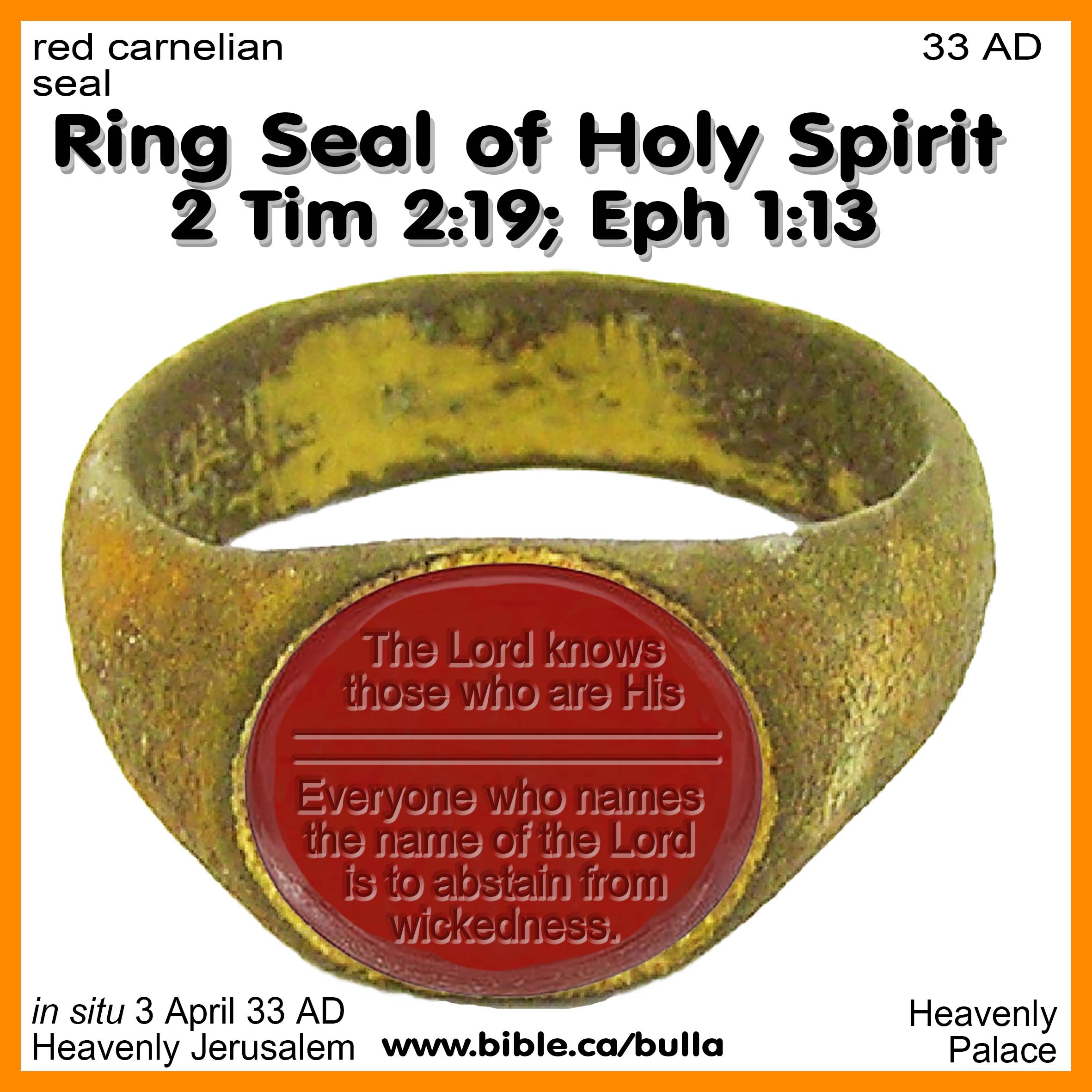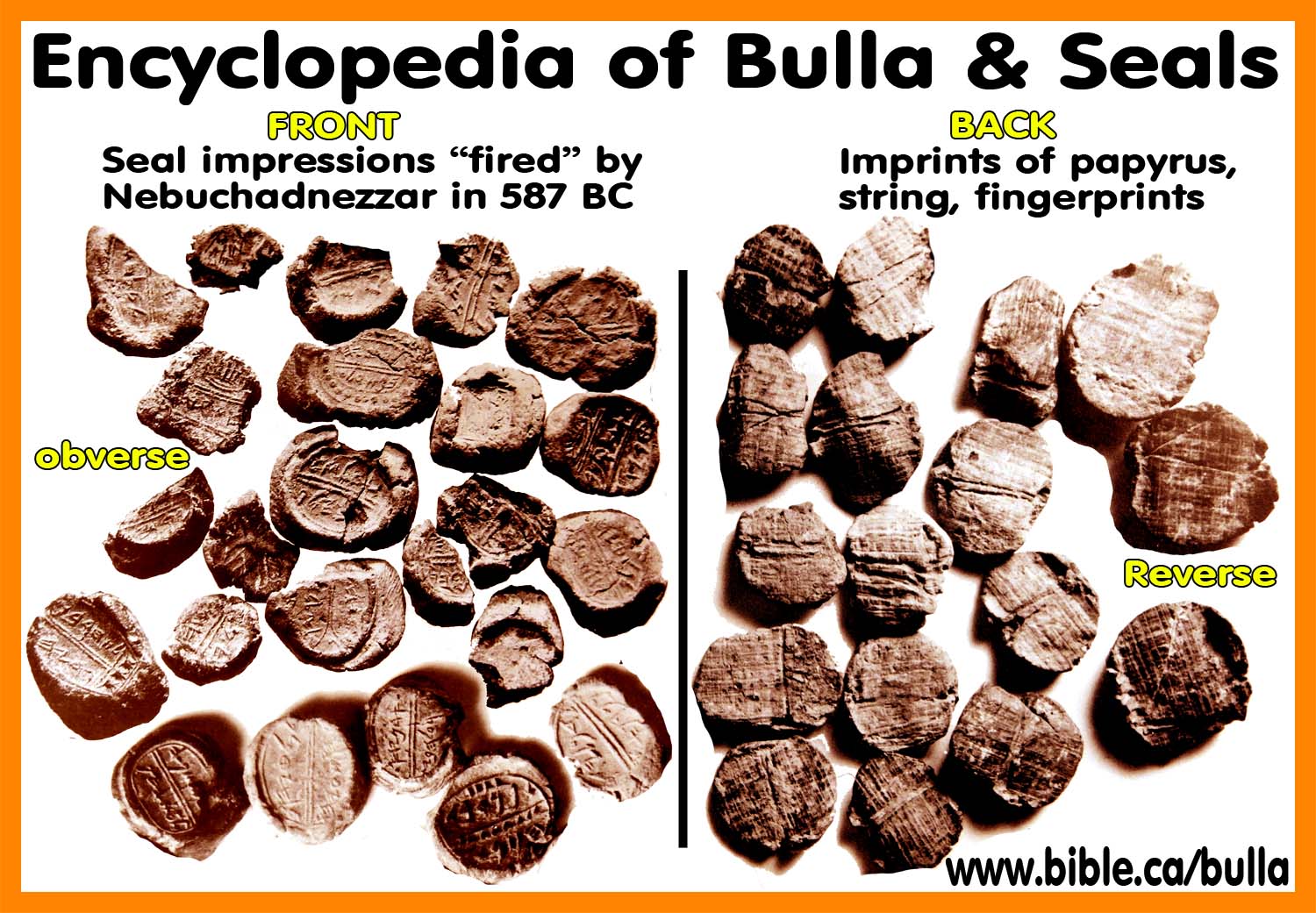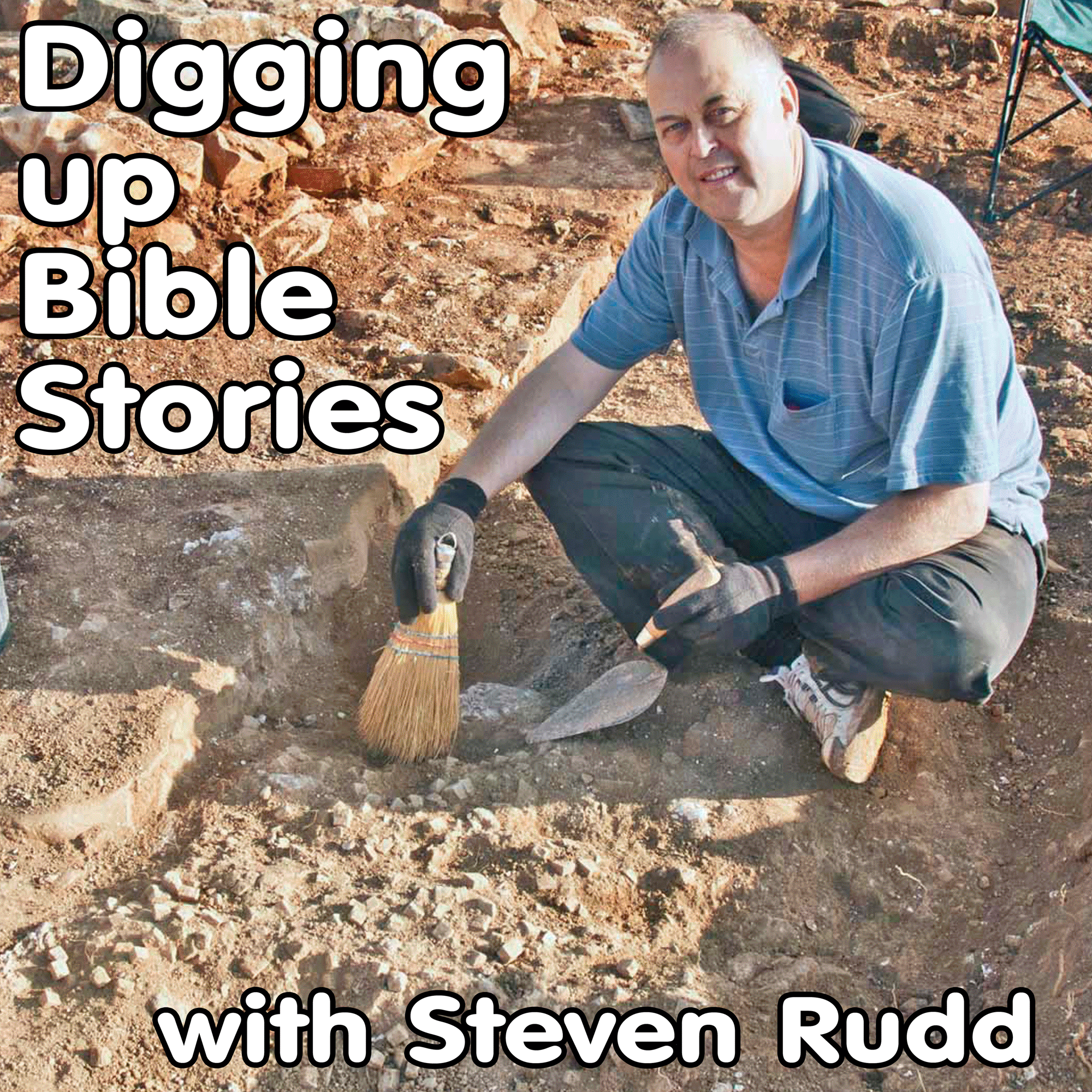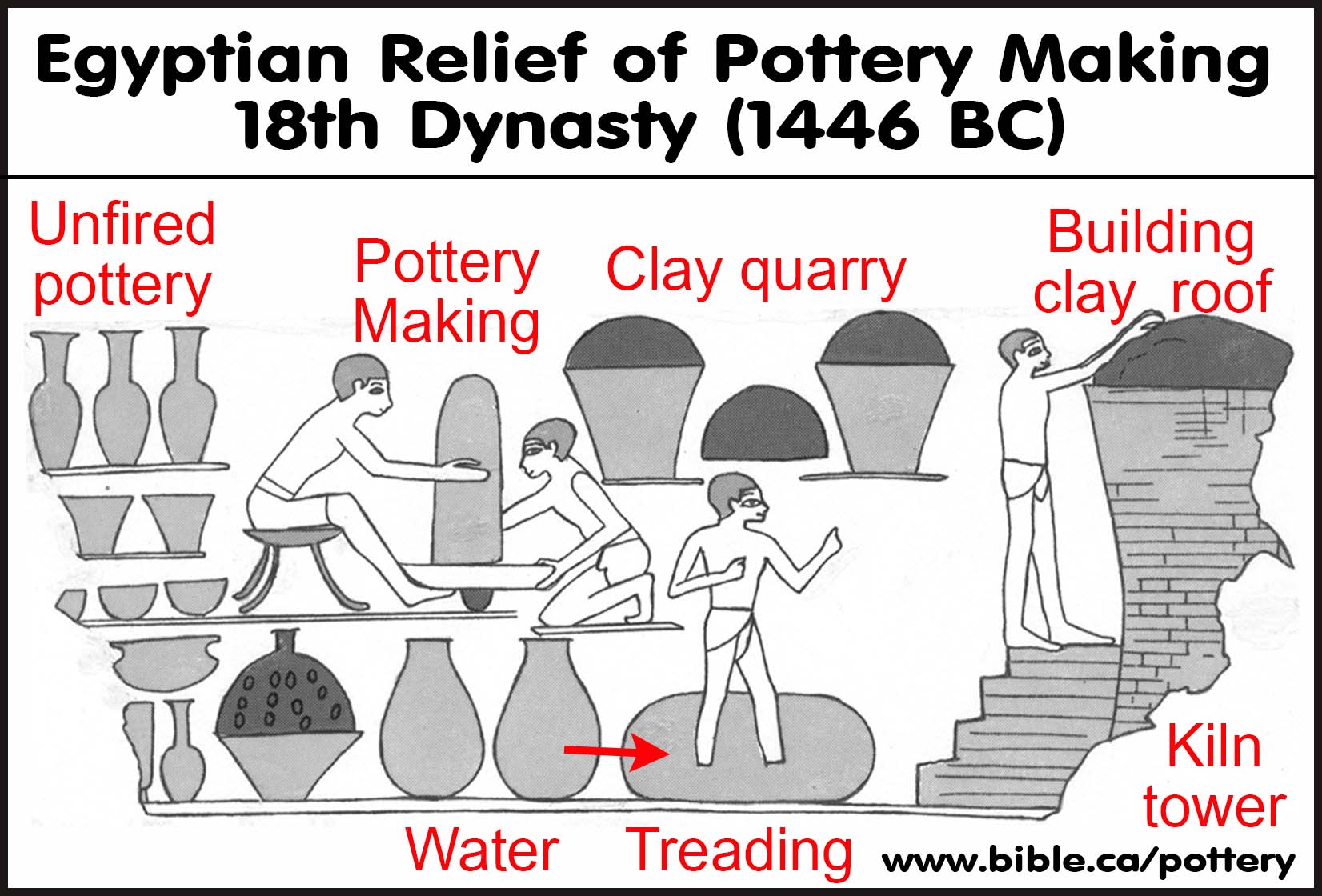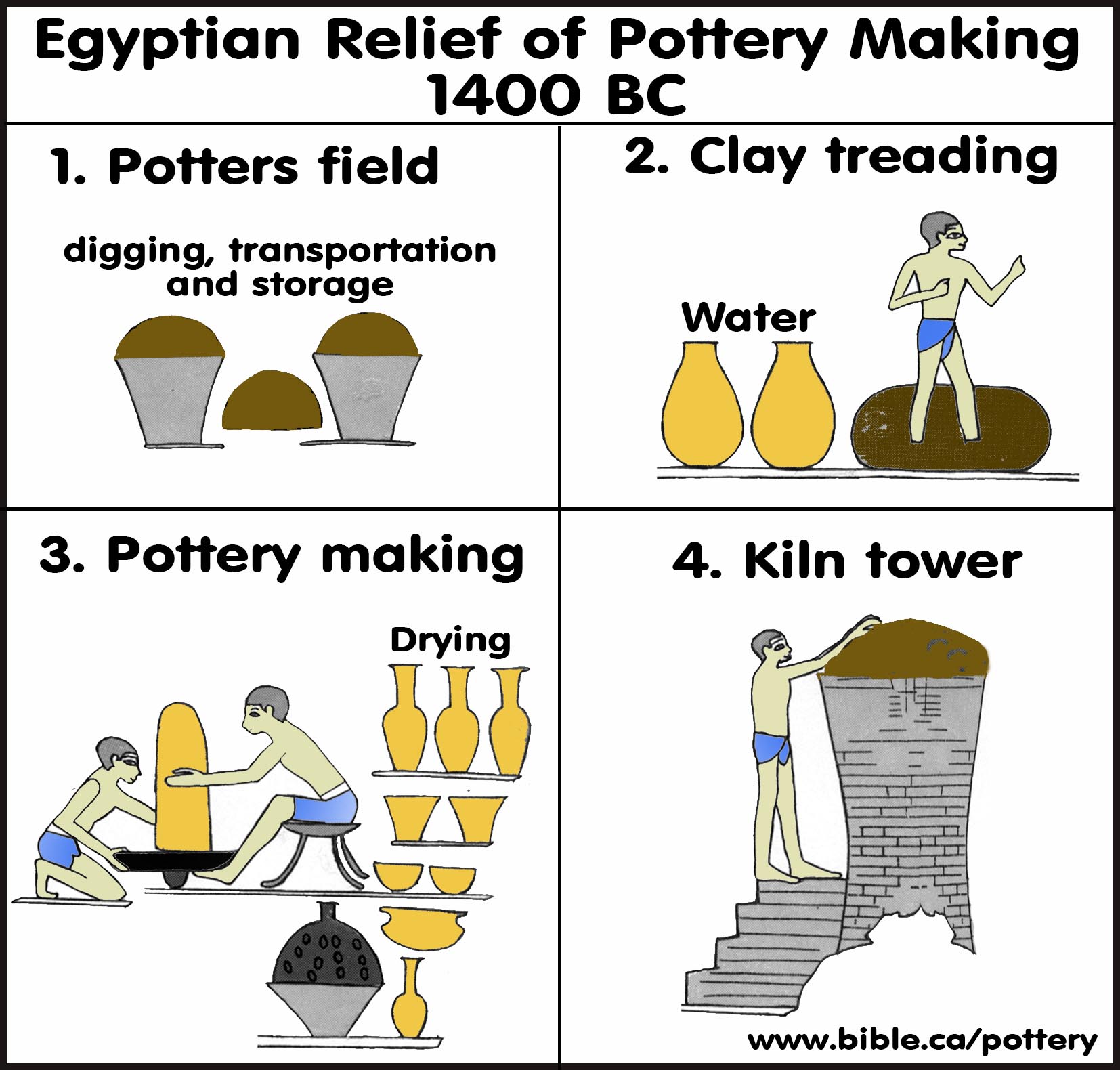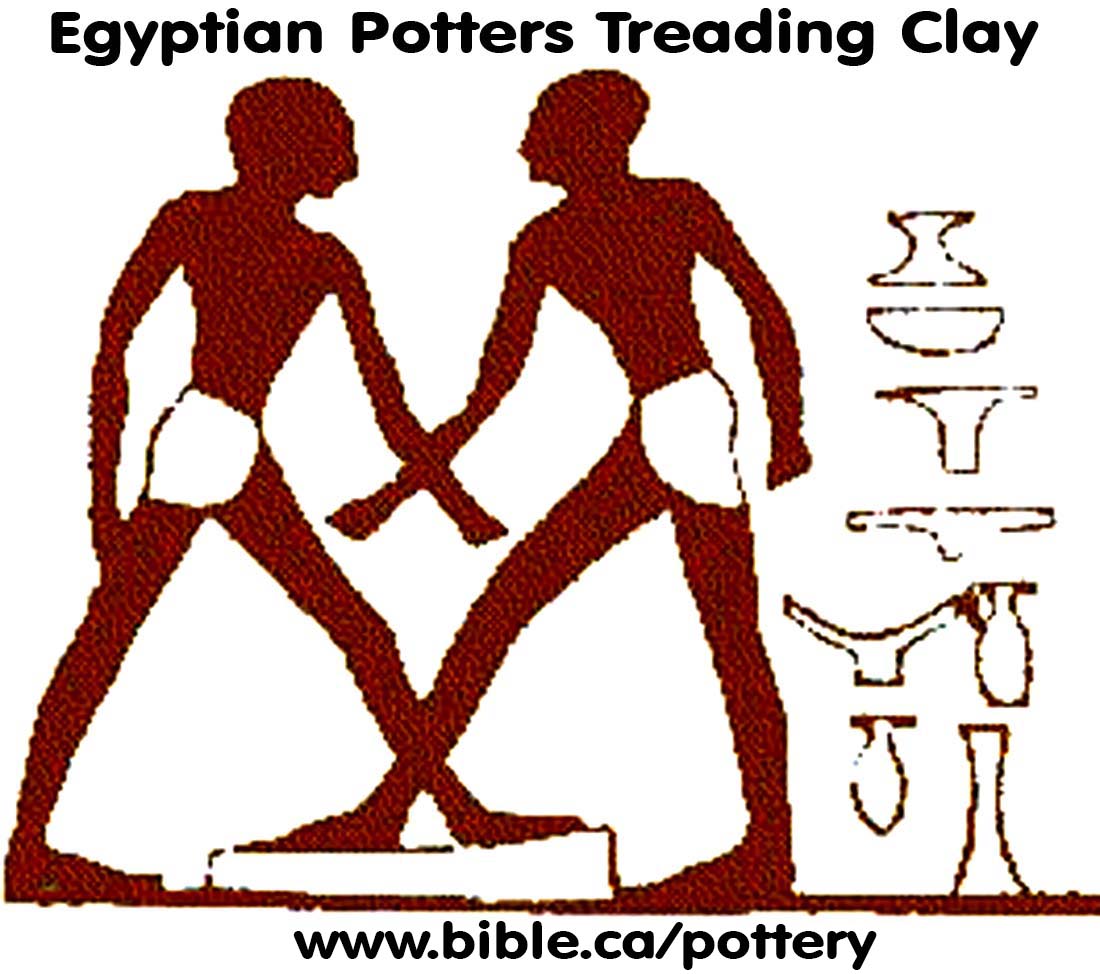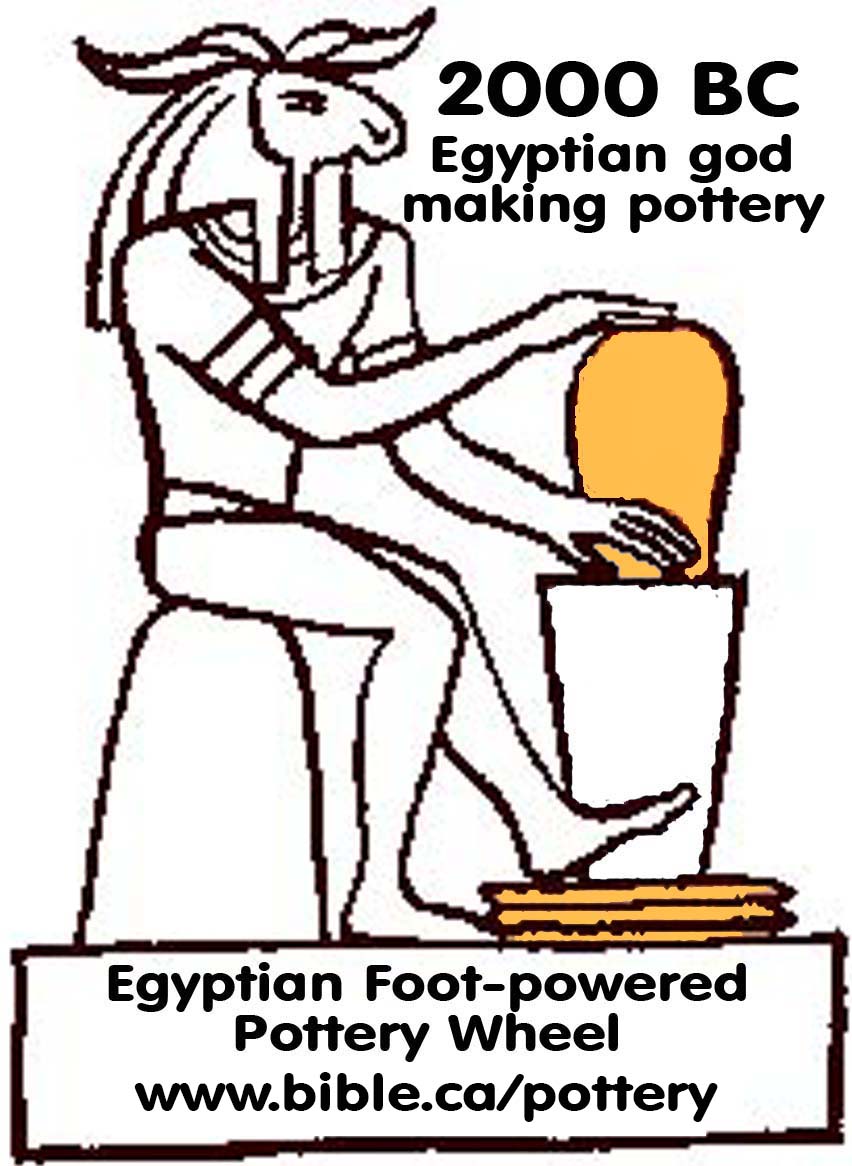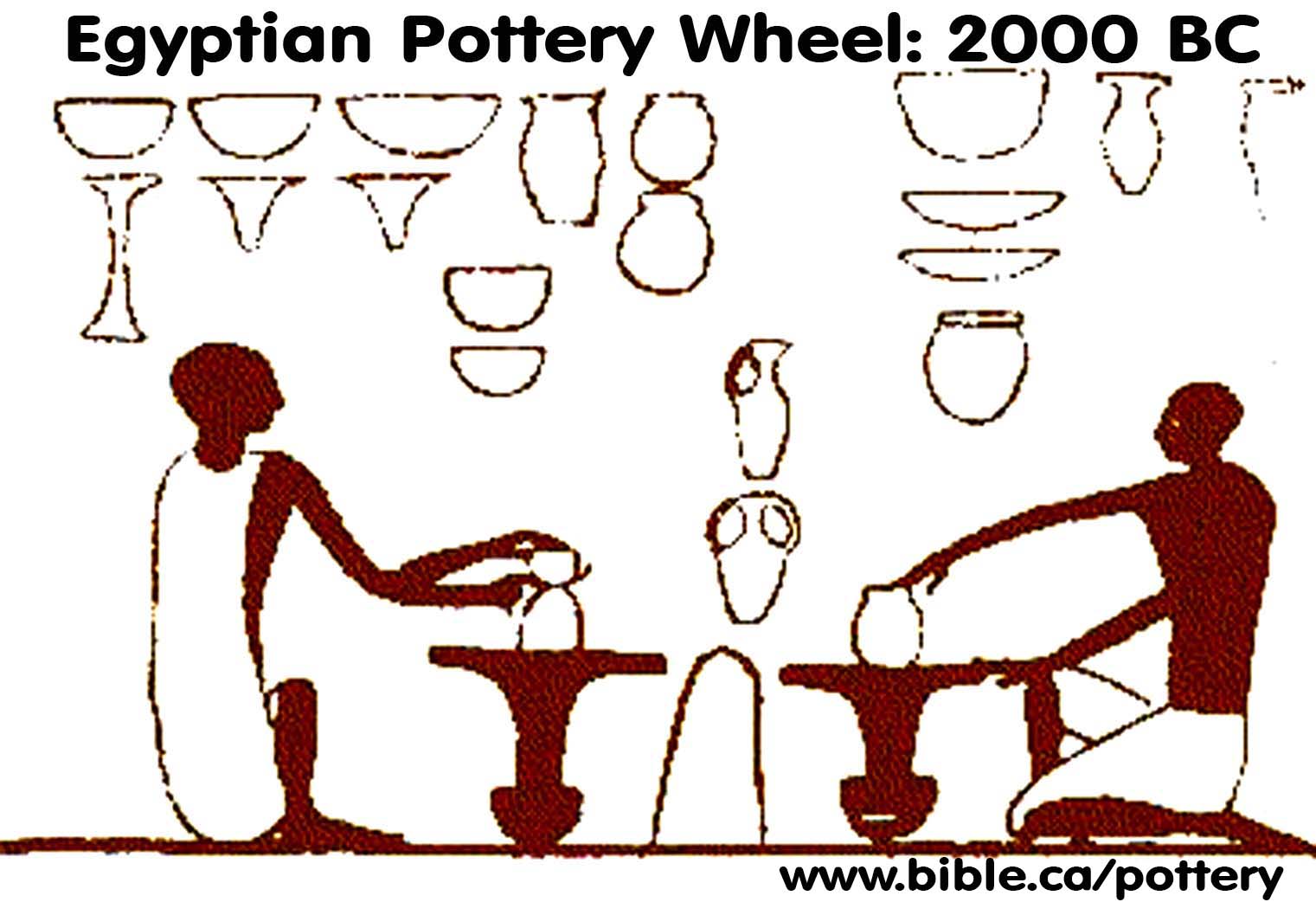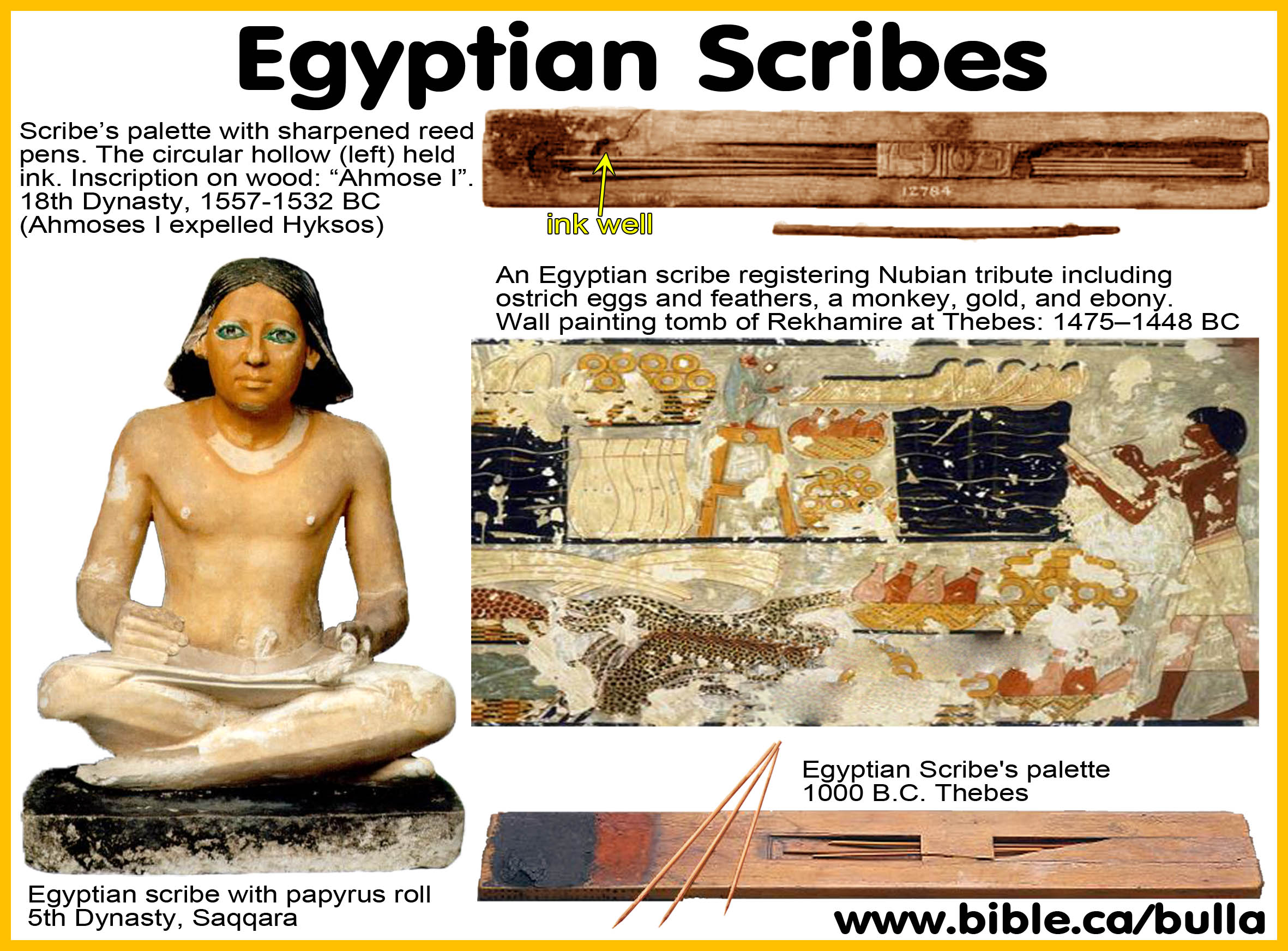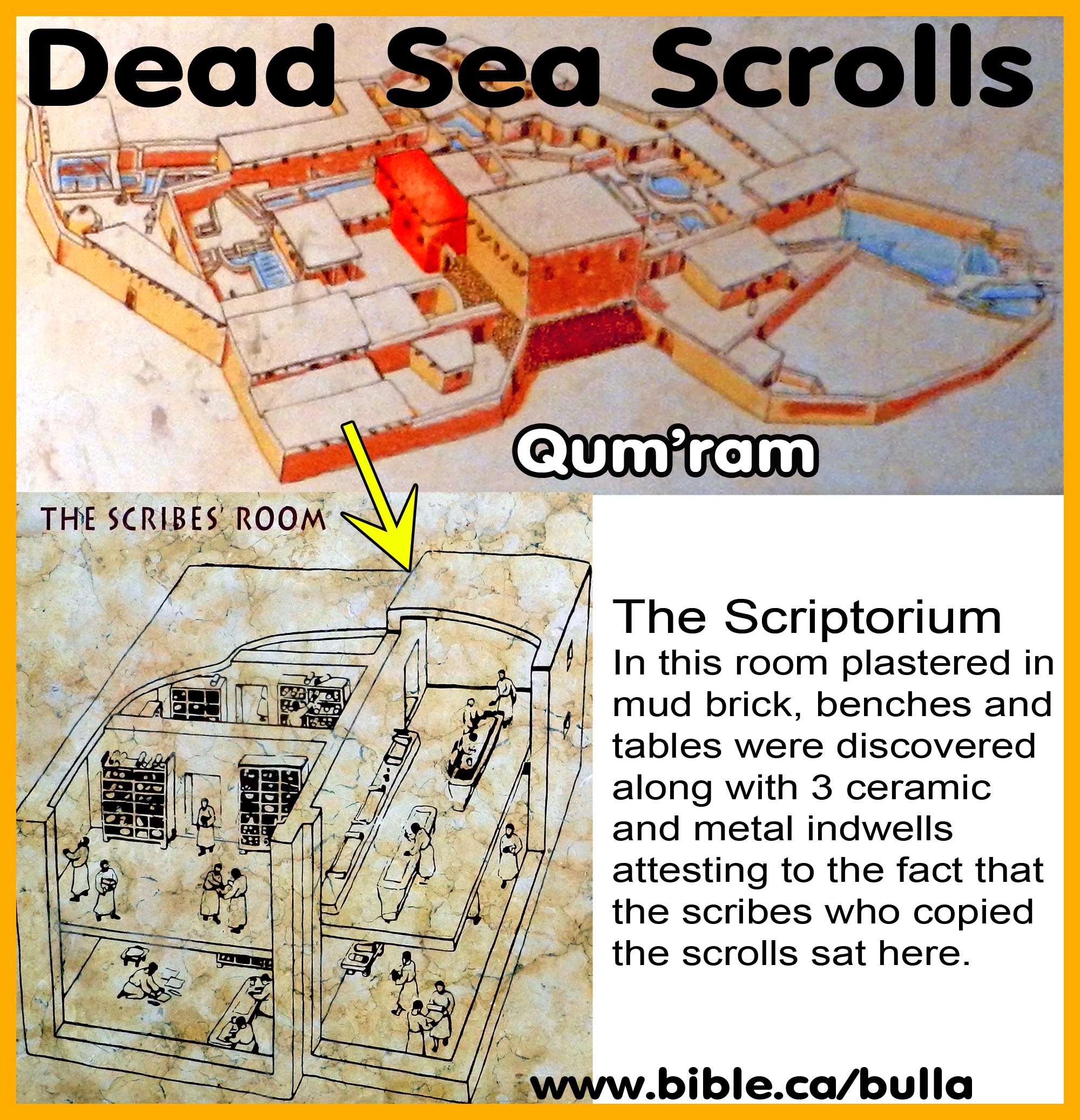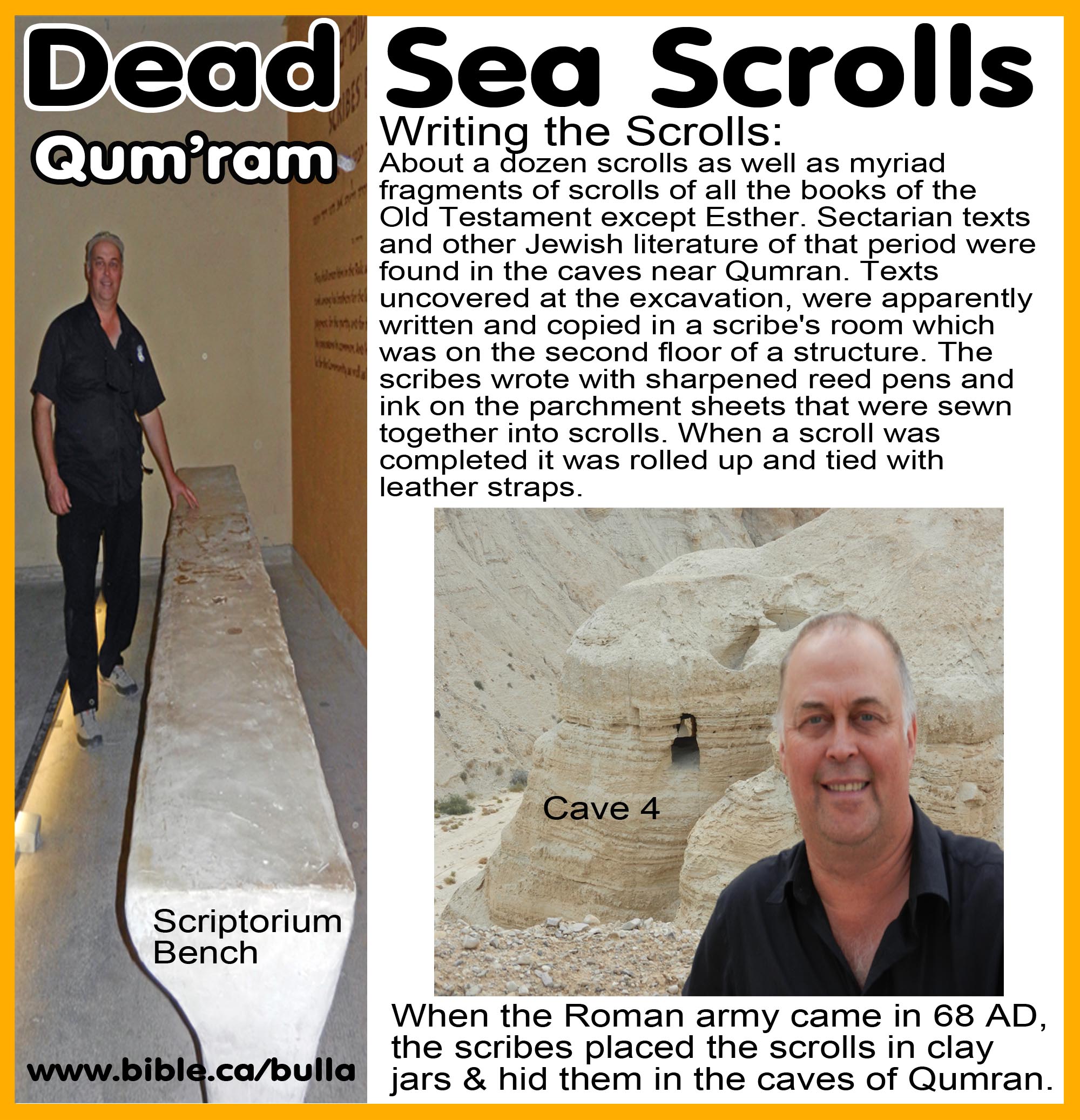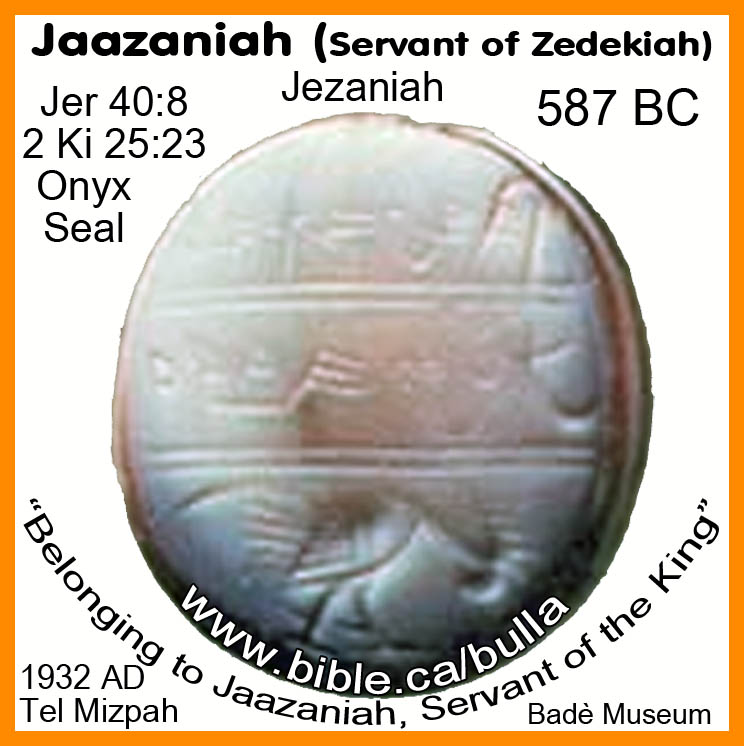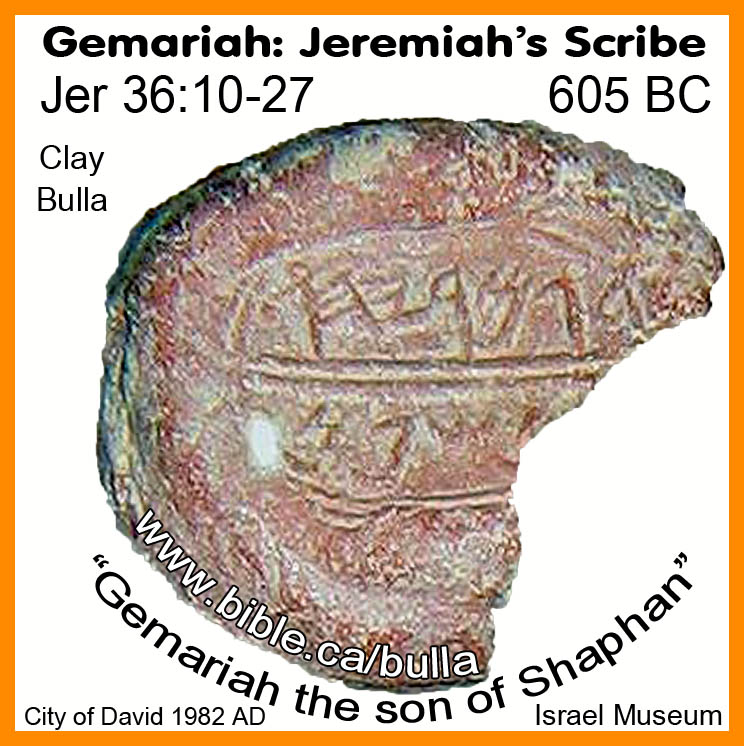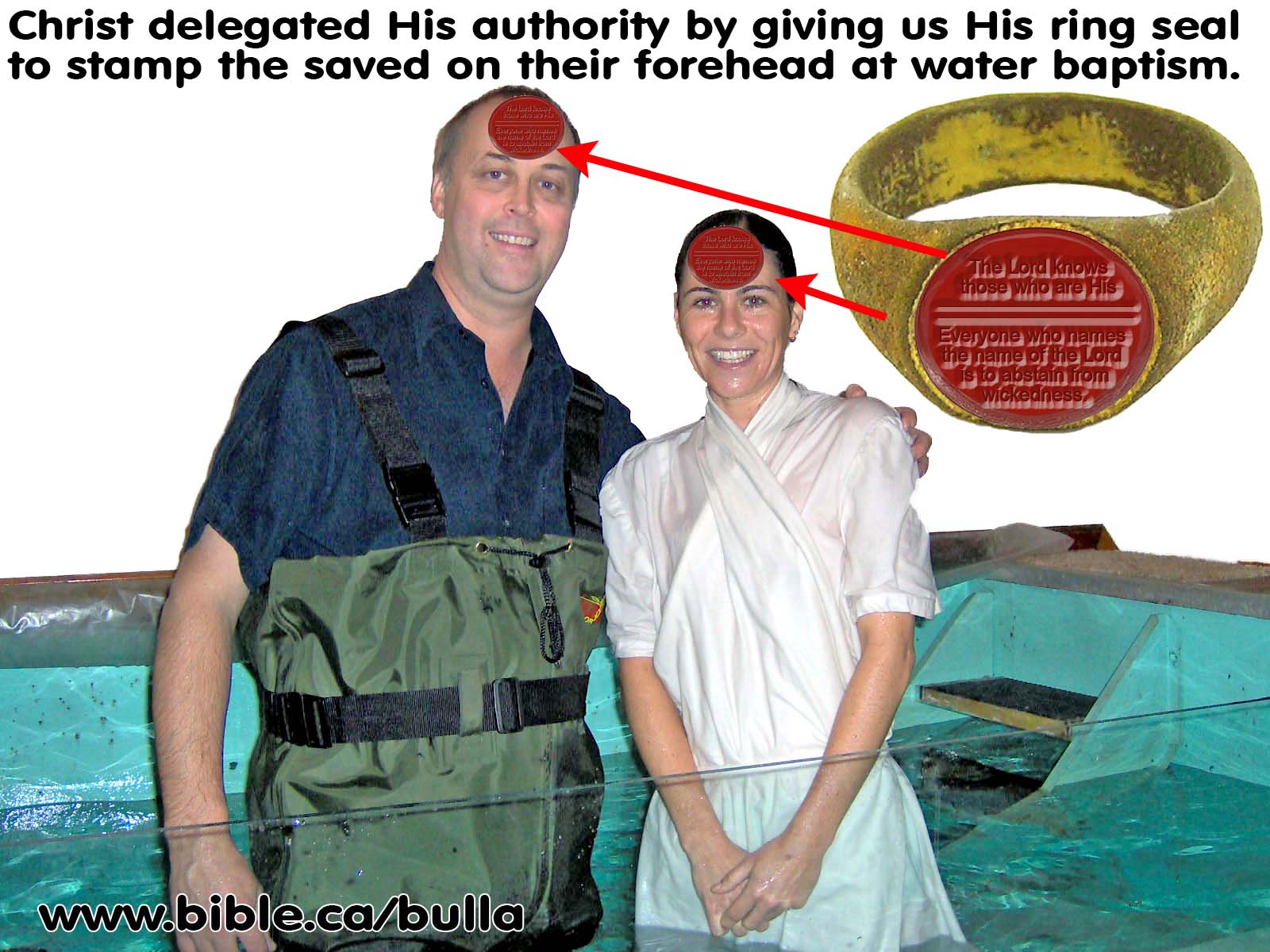Seals, Bulla,
Documents, Pottery & Antitypical New Testament Imagery
We are clay vessels that God has stamped with his seal!
|
God's Signet Stone: 2 Timothy 2:19 |
||
|
God's part: |
I will protect you! |
“The Lord knows those who are His” |
|
Man's part: |
Be holy! |
“Everyone who names the name of the Lord is to abstain from wickedness.” |
- "But we have this treasure in earthen vessels, so that the surpassing greatness of the power will be of God and not from ourselves;" (2 Corinthians 4:7)
- "Nevertheless, the firm foundation of God stands, having this seal, “The Lord knows those who are His,” and, “Everyone who names the name of the Lord is to abstain from wickedness.” Now in a large house there are not only gold and silver vessels, but also vessels of wood and of earthenware, and some to honor and some to dishonor. Therefore, if anyone cleanses himself from these things, he will be a vessel for honor, sanctified, useful to the Master, prepared for every good work." (2 Timothy 2:19–21)
- "In Him, you also, after listening to the message of truth, the gospel of your salvation—having also believed, you were sealed in Him with the Holy Spirit of promise," (Ephesians 1:13)
- "You are our letter, written in our hearts, known and read by all men; being manifested that you are a letter of Christ, cared for by us, written not with ink but with the Spirit of the living God, not on tablets of stone but on tablets of human hearts." (2 Corinthians 3:2-3)
|
|
||
|
See also the Encyclopedia of Bulla and Seals: FREE! The Exhibit: On-line Museum of Bulla and seals Security: Creation of ancient legal documents and the how bullae are made to seal papyrus paper. Forgeries: Known fake and misidentified bullae & seals |
||
|
|
||
|
Archaeologists are digging up bible stories!!! |
||
|
Archaeology is an important science that confirms the historical accuracy of the Bible. Since the Bible refers to hundreds of cities, kings, and places, we would expect to find evidence from on-site excavations. And this is exactly what we have found. The Bible is the most historically accurate book of history on earth. Read the Bible daily! |
|
|
|
|
||
New Testament antitypes of
Pottery, Seals, Bulla, Scribes and papyrus documents:
Introduction:
- This fascinating study of archeology explores New Testament antitypes of the most common everyday objects in ancient Israel and the first century church.
- Papyrus or animal skin documents
- Quills, ink and ink wells
- Seals, signet ring seals and bulla
- Potter's fields, clay treading, the visit to the local potter's shop, fast and slow pottery wheels, kiln towers and the sale of all kinds of pottery in the open market.
- Pottery, and pieces of broken pottery in secondary use
- Quick links inside this document:
i. Seals authenticated household Identity: Christians are "of Christ's House"
ii. Seals facilitated the delegation of authority
iii. Seals identified ownership:
iv. Seals guaranteed security from tampering or changing the contract:
v. Seals created secret time capsules.
vi. Seals showed validation and approval of the object stamped:
vii. Seals were tangible pledges of security
I. Pottery, pottery making and antitypical New Testament imagery:
- Potter's field where clay was mined: Valley of Hinnom, Topheth, Potter's field, field of blood, Judas
- "Thus said the Lord: Go and buy a potter’s earthenware jug. Take with you some of the elders of the people and some of the senior priests, and go out to the valley of the son of Hinnom at the entry of the Potsherd Gate, and proclaim there the words that I tell you. … Then you are to break the jar in the sight of the men who accompany you and say to them, ‘Thus says the Lord of hosts, “Just so will I break this people and this city, even as one breaks a potter’s vessel, which cannot again be repaired; and they will bury in Topheth because there is no other place for burial." (Jeremiah 19:1-2; 10-11)
- "I said to them, “If it is good in your sight, give me my wages; but if not, never mind!” So they weighed out thirty shekels of silver as my wages. Then the Lord said to me, “Throw it to the potter, that magnificent price at which I was valued by them.” So I took the thirty shekels of silver and threw them to the potter in the house of the Lord." (Zechariah 11:12–13)
- "The chief priests took the pieces of silver and said, “It is not lawful to put them into the temple treasury, since it is the price of blood.” And they conferred together and with the money bought the Potter’s Field as a burial place for strangers. For this reason that field has been called the Field of Blood to this day. Then that which was spoken through Jeremiah the prophet was fulfilled: “And they took the thirty pieces of silver, the price of the one whose price had been set by the sons of Israel; and they gave them for the Potter’s Field, as the Lord directed me.”" (Matthew 27:6–10)
- God is the master pottery maker:
- "You turn things upside down! Shall the potter be regarded as the clay? Shall the thing made say of its maker, “He did not make me”; or the thing formed say of the one who formed it, “He has no understanding”?" (Isaiah 29:16)
- "Woe to you who strive with your Maker, earthen vessels with the potter! Does the clay say to the one who fashions it, “What are you making”? or “Your work has no handles”?" (Isaiah 45:9)
- "The word that came to Jeremiah from the Lord: “Come, go down to the potter’s house, and there I will let you hear my words.” So I went down to the potter’s house, and there he was working at his wheel. The vessel he was making of clay was spoiled in the potter’s hand, and he reworked it into another vessel, as seemed good to him. Then the word of the Lord came to me: Can I not do with you, O house of Israel, just as this potter has done? says the Lord. Just like the clay in the potter’s hand, so are you in my hand, O house of Israel." (Jeremiah 18:1–6)
- Kiln ovens and towers:
- Pottery kilns had to be hand packed on shelves and a clay
roof was made for each firing. An air vent was used to stoke the fire
with fuel and a bellows of some type. When firing was complete, the roof
would be broken and the new pottery would be removed.
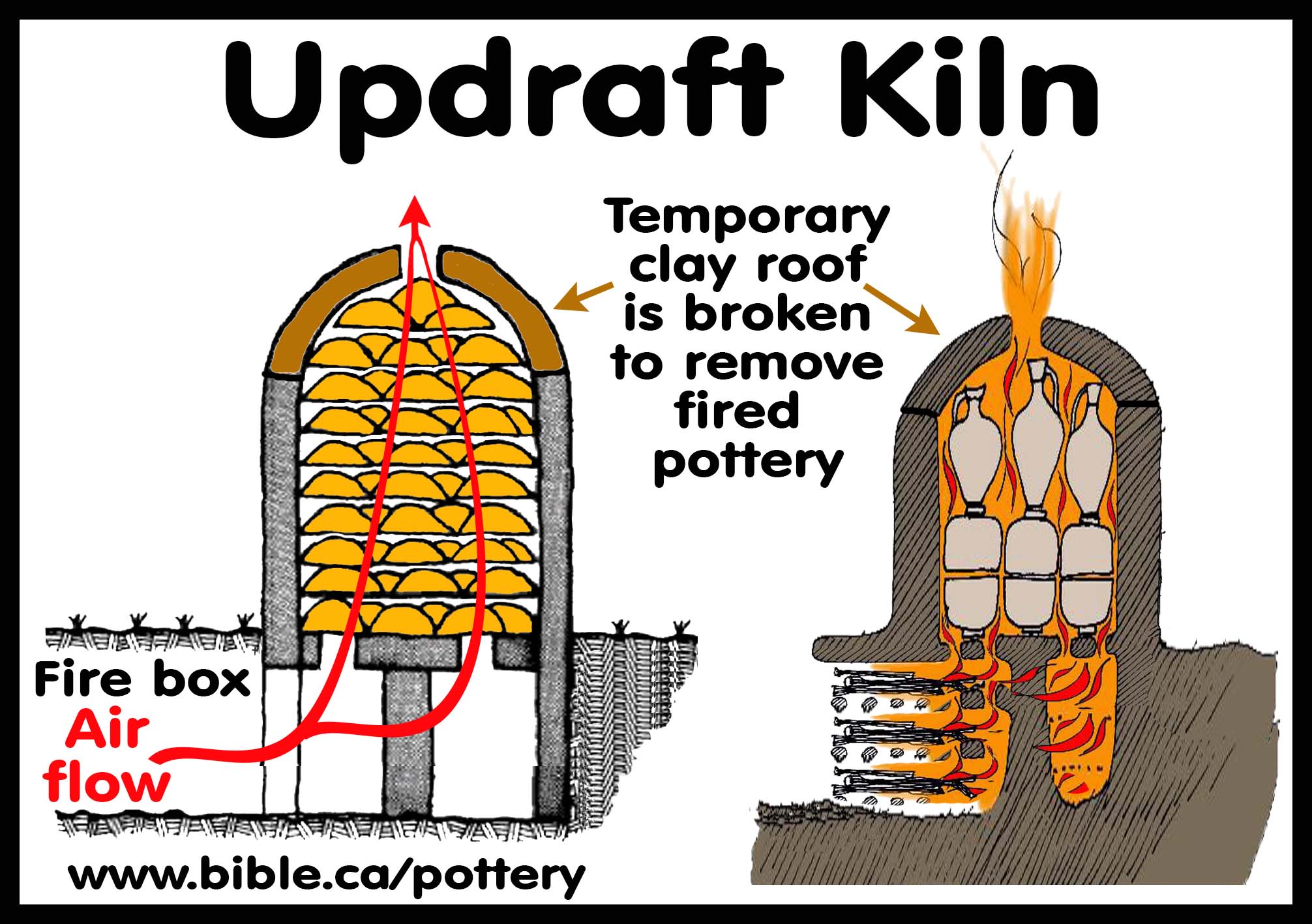
- "above the Tower of the Ovens, to the Broad Wall," (Nehemiah 12:38)
- "For his burning place has long been prepared; truly it is made ready for the king, its pyre [kiln] made deep and wide, with fire and wood in abundance; the breath of the Lord, like a stream of sulfur, kindles it." (Isaiah 30:33)
- Egyptian relief of pottery kiln tower:
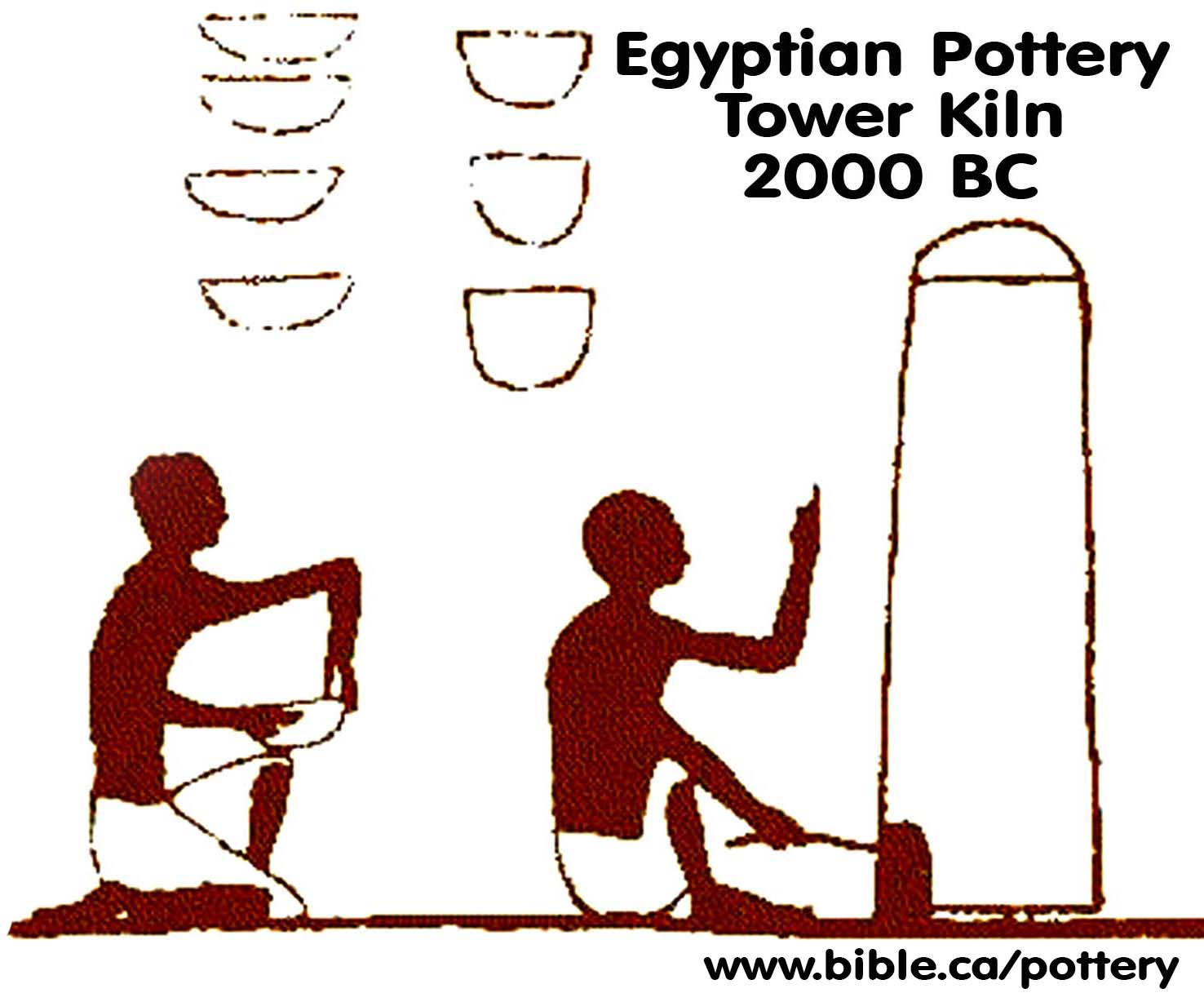
- Two Bilobate Persian period kilns from Khirbet Nisya that
date to 536-333 AD
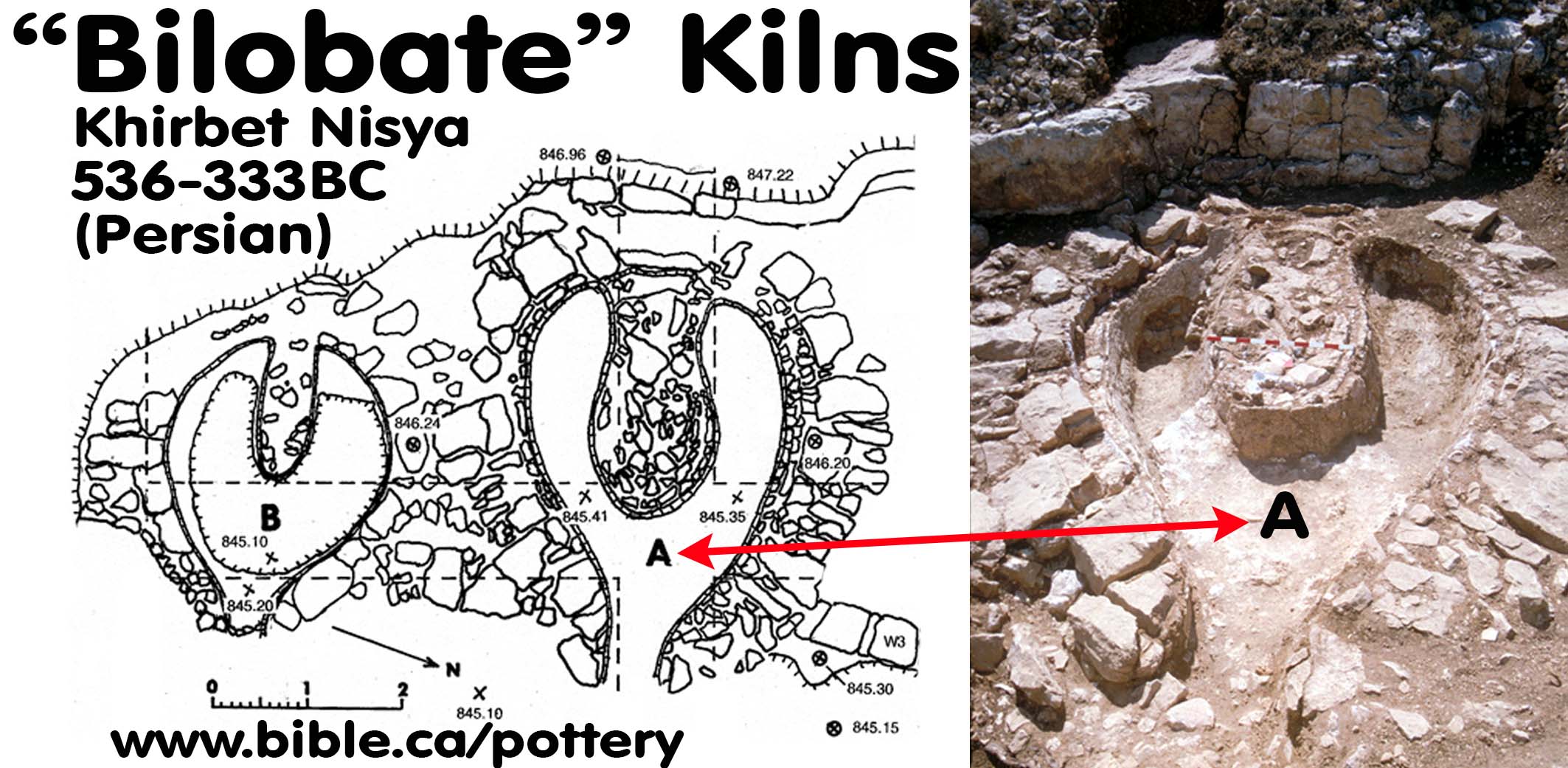
- Byzantine Kiln at Yad Hasmona (Kiriath Jearim) dating to
425 AD
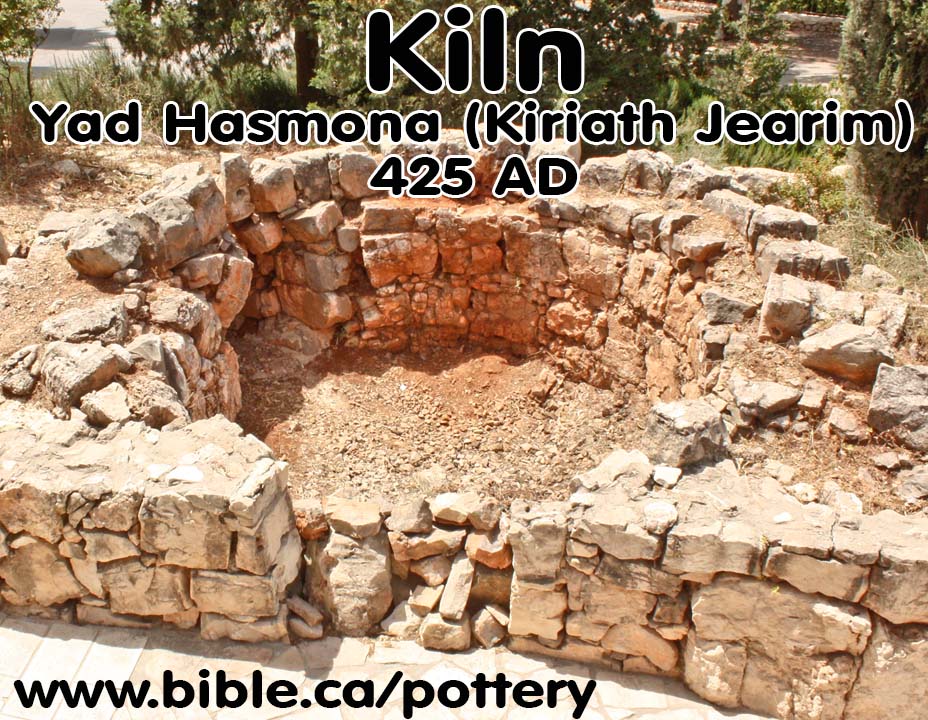
- Byzantine kiln at Khirbet el-Maqatir dating to 375-749 AD
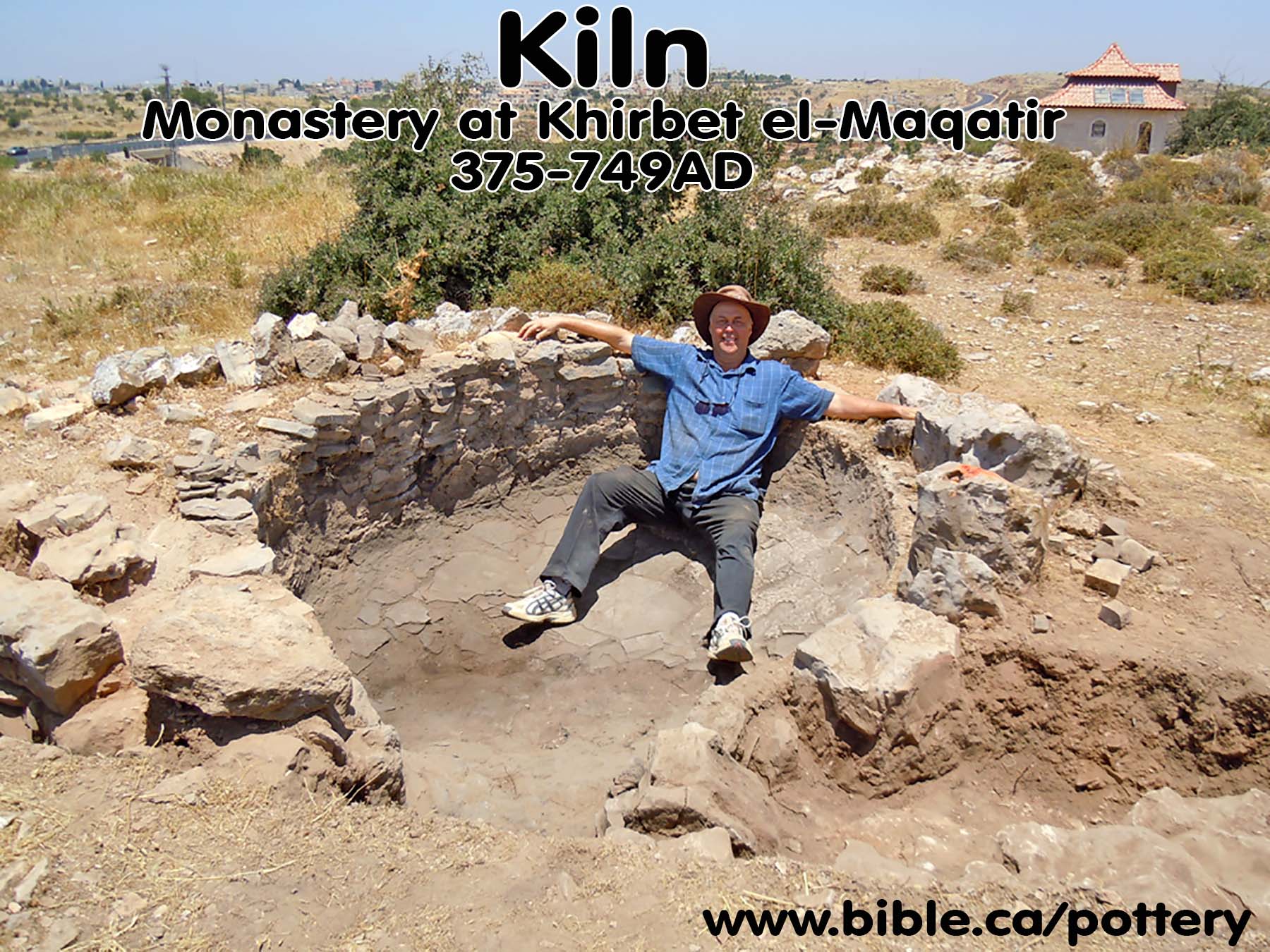
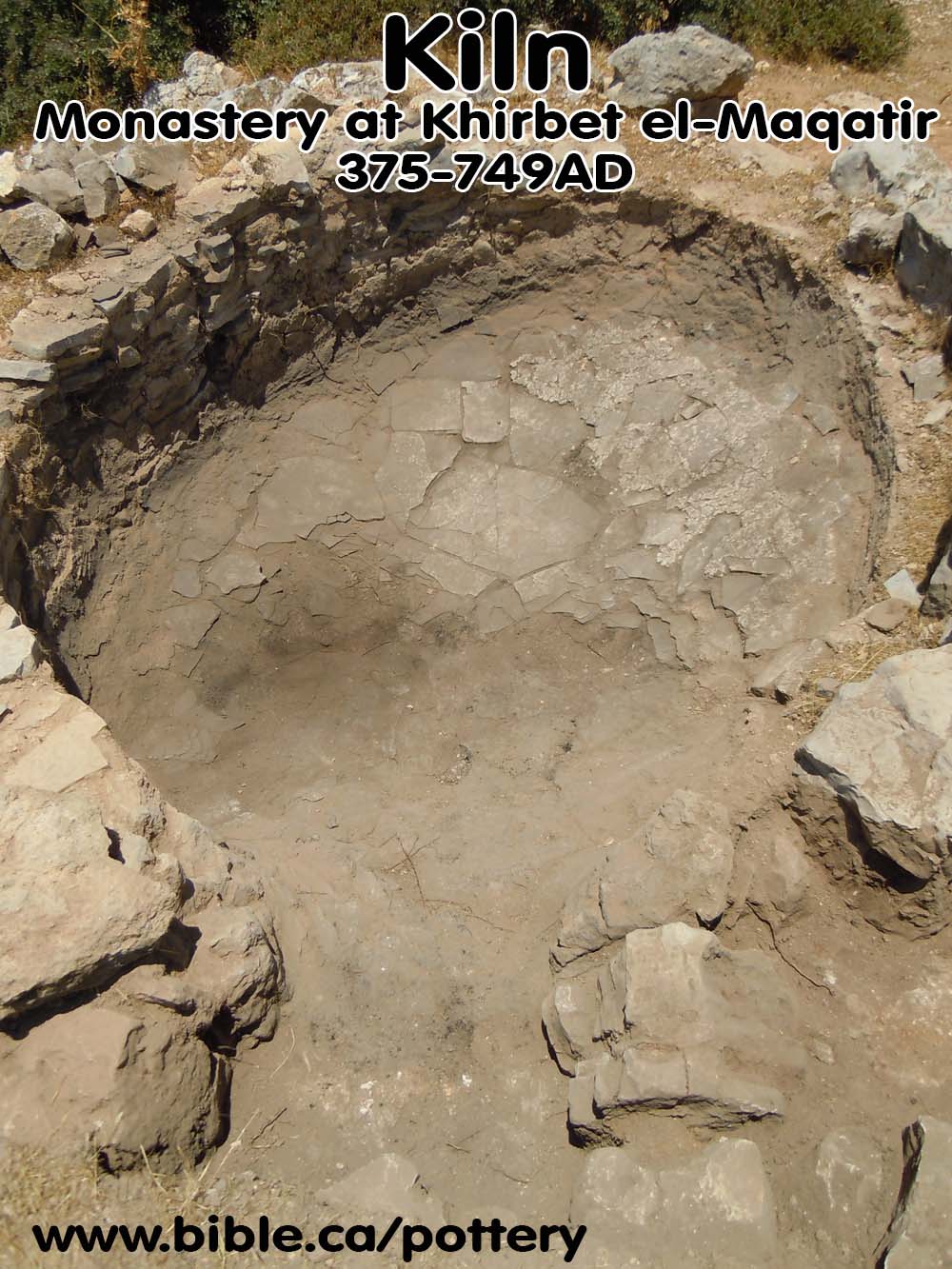

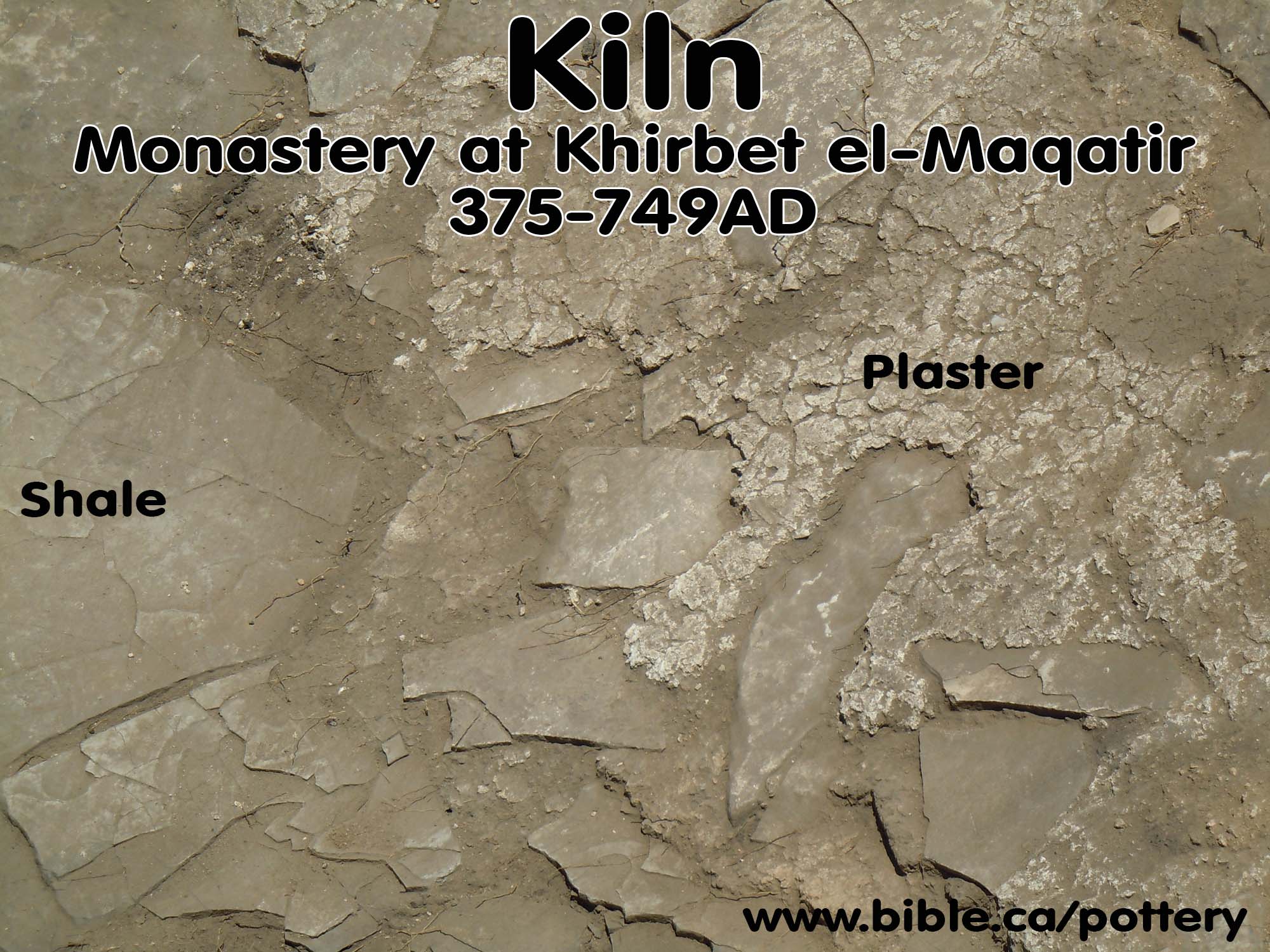
- City Dump of Broken pottery
- "go out to the valley of the son of Hinnom at the entry of the Potsherd Gate, and proclaim there the words that I tell you." (Jeremiah 19:1–2)
- The potsherd gate was the exit from the city to where everyone dumped their broken pottery outside the wall.
- Every piece of broken fired pottery ever made still exists being essentially equivalent to rock. This means that if you spent enough time, you could rebuild many whole pottery vessels from the sherd dump.
- Pictured here are thousands of pottery sherds that are
over 2000 years old at Beth Shemesh.

- Sherds of broken pottery for secondary use:
- Secondary use of pottery sherds is very common for even Job used a broken pottery sherd to scrape the surface of his skin to pop the boils Satan gave him. They have been used to scrape meat off bones, for polishing, grinding, drill holes and tie strings to created loom weights for fabric construction, etc.
- Pot broken into very small pieces no secondary use: " whose crash comes suddenly, in an instant; its breaking is like that of a potter’s vessel that is smashed so ruthlessly that among its fragments not a sherd is found for taking fire from the hearth, or dipping water out of the cistern." (Isaiah 30:14)
- "my mouth is dried up like a potsherd, and my tongue sticks to my jaws; you lay me in the dust of death." (Psalm 22:15)
- "Then Satan went out from the presence of the Lord
and smote Job with sore boils from the sole of his foot to the crown of
his head. And he took a potsherd to scrape
himself while he was sitting among the ashes." (Job 2:7–8)
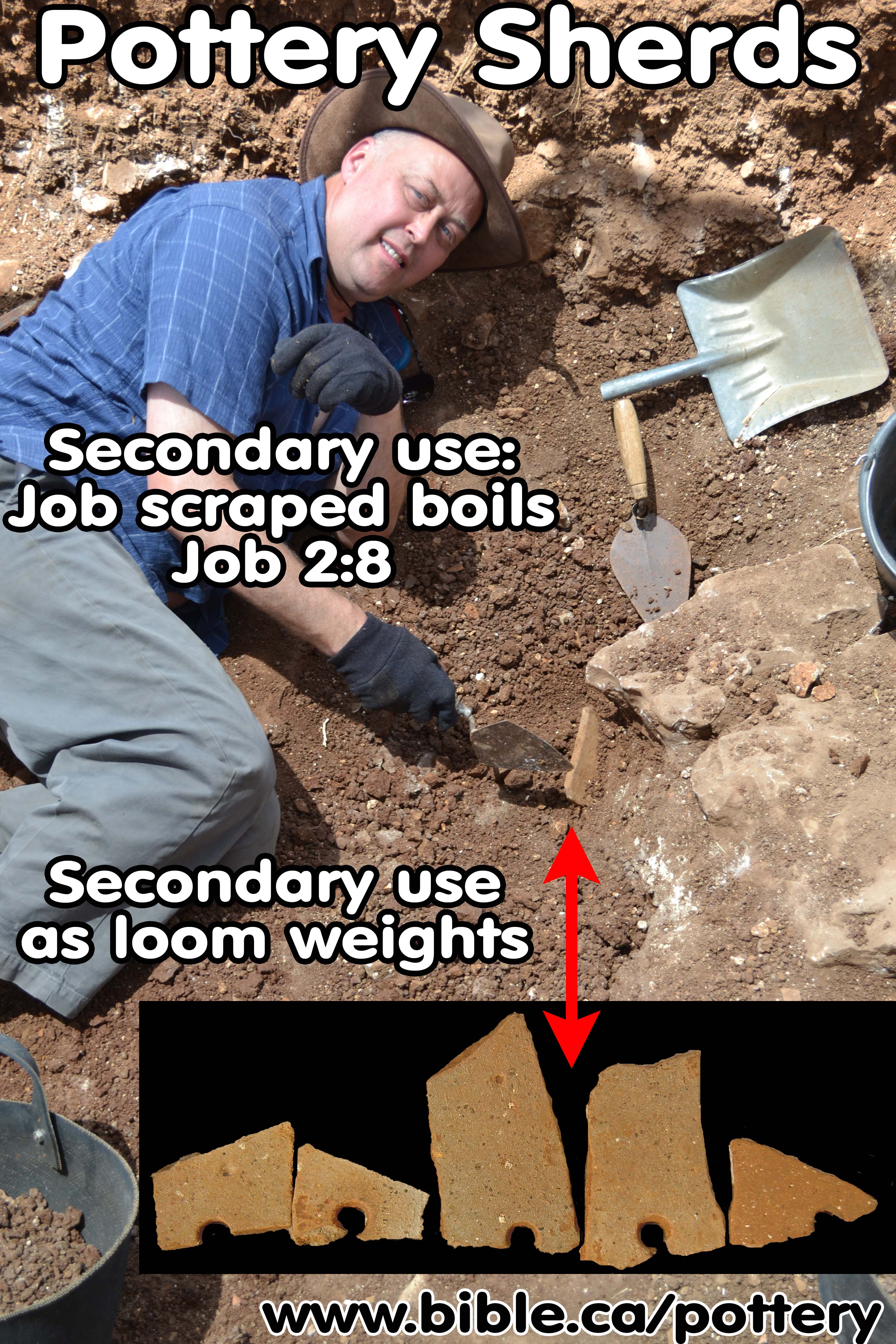
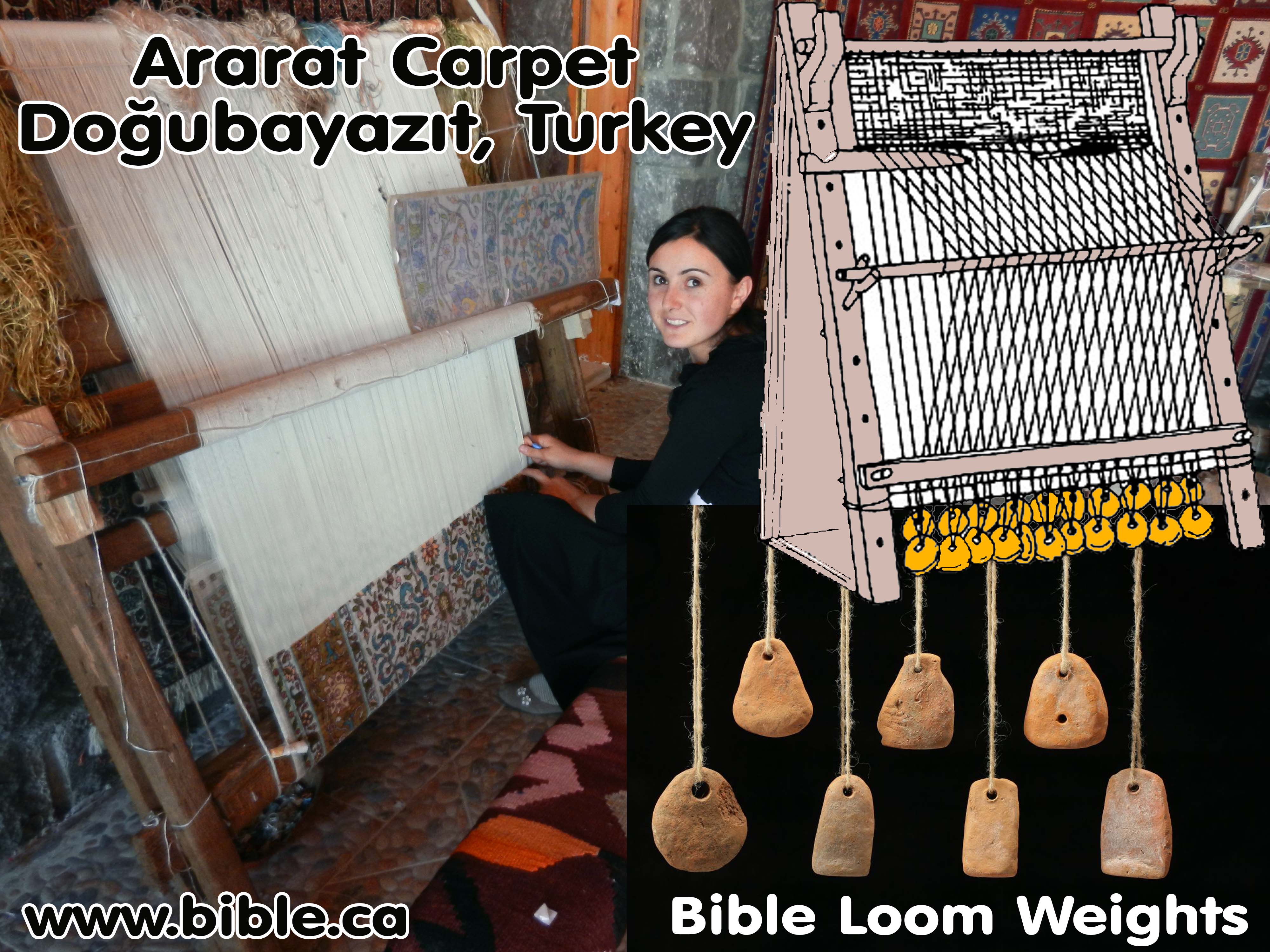
- Christians are clay pottery jars:
- "But we have this treasure in clay jars, so that it may be made clear that this extraordinary power belongs to God and does not come from us." (2 Corinthians 4:7)
- "In a large house there are utensils not only of gold and silver but also of wood and clay, some for special use, some for ordinary. All who cleanse themselves of the things I have mentioned will become special utensils, dedicated and useful to the owner of the house, ready for every good work." (2 Timothy 2:20–21)
- Man is made of clay: "then the Lord God formed man from the dust of the ground, and breathed into his nostrils the breath of life; and the man became a living being." (Genesis 2:7)
- "But who indeed are you, a human being [clay pot], to argue with God? Will what is molded say to the one who molds it, “Why have you made me like this?” Has the potter no right over the clay, to make out of the same lump one object for special use and another for ordinary use?" (Romans 9:18–21)
II. Scribes: Each Christian is a scribe!
|
|
Here is a sculpture in the Louvre of a seated Greek scribe from the 6th century BC found at Thebes in Greece. He is holding a writing instrument and parchment. |
- Scribes have existed from the time of Noah down to the time of Jesus.
- A scribe was a language expert, fluent in reading and writing the native language.
- While Moses required all Jews to learn to read and write in the command to teach their children the words of the law, not all were literate.
- Scribes were important positions in government and the legal system.
- Scribes recorded the inspired words of the Bible:
- "Then Jeremiah took another scroll and gave it to Baruch the son of Neriah, the scribe, and he wrote on it at the dictation of Jeremiah all the words of the book which Jehoiakim king of Judah had burned in the fire; and many similar words were added to them." (Jeremiah 36:32)
- Scribes were also leaders, teachers and experts of the religious law of Moses:
- "Ezra the scribe stood at a wooden podium which they had made for the purpose. … Ezra opened the book in the sight of all the people for he was standing above all the people; and when he opened it, all the people stood up." (Nehemiah 8:4-5)
- Herod ordered "Gathering together all the chief priests and scribes of the people, he inquired of them where the Messiah was to be born." (Matthew 2:4)
- "And His disciples asked Him, “Why then do the scribes say that Elijah must come first?”" (Matthew 17:10)
- “The scribes and the Pharisees have seated themselves in the chair of Moses; therefore all that they tell you, do and observe, but do not do according to their deeds; for they say things and do not do them." (Matthew 23:2–3)
- As legal experts Scribes at Jesus time loved to offer all possible legal interpretations and let the people decide which was correct. In contrast, Jesus gave definitive, black and white directives on doctrine and moral issues. Scribes taught like modern lawyers but Jesus taught like the judge:
- "When Jesus had finished these words, the crowds were amazed at His teaching; for He was teaching them as one having authority, and not as their scribes." (Matthew 7:28–29)
- Scribes were like lawyers or bonded justice's of the peace trusted, oath-bound public officials recorded official information like court stenographers whose written documents were considered trustworthy and authentic:
- Officiates like a modern lawyers or a bonded justice of the peace or a court recorder.
- "Jehoshaphat the son of Ahilud was the recorder;" (1 Kings 4:3)
- "When they saw that there was much money in the chest, the king’s scribe and the high priest came up and tied it in bags and counted the money which was found in the house of the Lord." (2 Kings 12:10)
- "Joah the son of Asaph the recorder" (2 Kings 18:18)
- "Shimshai the scribe wrote a letter against Jerusalem to King Artaxerxes" (Ezra 4:8–9)
- "Then the king’s scribes were summoned and it was written just as Haman commanded to the king’s satraps, to the governors who were over each province and to the princes of each people, each province according to its script, each people according to its language, being written in the name of King Ahasuerus and sealed with the king’s signet ring." (Esther 3:12)
- Scribes were trusted stewards of documents, money and assets who could also violate their "oath of office through corruption":
- "“How can you say, ‘We are wise, And the law of the Lord is with us’? But behold, the lying pen of the scribes Has made it into a lie." (Jeremiah 8:8)
- "“Woe to you, scribes and Pharisees, hypocrites, because you travel around on sea and land to make one proselyte; and when he becomes one, you make him twice as much a son of hell as yourselves." (Matthew 23:15)
- “Woe to you, scribes and Pharisees, hypocrites! For you tithe mint and dill and cummin, and have neglected the weightier provisions of the law: justice and mercy and faithfulness; but these are the things you should have done without neglecting the others." (Matthew 23:23)
- SCRIBAL KIT or Writing Case: Scribe carried around a "scribe Kit" that had papyrus or bamboo quill pens, various colours of ink, a blotting surface and parchment.
- "Then the glory of the God of Israel went up from the cherub on which it had been, to the threshold of the temple. And He called to the man clothed in linen at whose loins was the writing case." (Ezekiel 9:3,11)
- "On his hips he carried a scribe’s kit (qeset hassōpēr). qeset is a loanword from Egyp. gsty, which designated a palette with a slot for the pen and hollowed out containers for ink, usually two, for red and black ink, respectively." (NICOT, Ezekiel 9:1–2, 1997 AD)
- "scribe’s kit. “A palette with a slot in which the pens were kept, and hollowed places in which the ink was put, generally two—for black and red ink … the Hebrew word [qeset] was an Egyptian loan word gst(y) ‘writing outfit’ ” (G. R. Driver, Semitic Writing, rev. ed. [London: Oxford University Press, 1954], p. 86, pl. 31.1). An Egyptian scribe with his kit tucked into his waistband is portrayed in Views of the Biblical World [Hebrew], ed. B. Mazar" (AYBC, Ezekiel 9:2, 2008 AD)
- "The instrument of a scribe (which is denoted by an Egyptian loanword [note f]), which hangs from his girdle, further identifies the figure as a scribe. In early Egypt the scribe’s instrument consisted of a palette with two small containers for black and red ink, a small container for rushes, and a bowl with water. From the Middle Kingdom the container for rushes was fitted to the square, board-like wooden palette itself. In Babylonia the stylus (qan ṭuppi—stylus for the [clay] tablet) was usually carried in a leather case “in the bands of the hips.” In the divine world Nebo was particularly known as the scribe deity. His stylus may be illustrated among the emblems of the gods on boundary stones. Since Nebo is identified on the stele of Adadnirari II as “he who holds the scribe’s stylus,” Gunkel “Schreiberengel,” believed he could find in the god Nebo, in the group of the seven planet deities, the immediate prototype for Ezek 9f. The clear connection of priestly features with those of the office of scribe, a consideration of the technique of a scribe in which the painting of a sign on the forehead with a reed is more conceivable than the impressing of the scribe’s stylus associated with Nebo, as well as the Egyptian derivation of the designation for a scribe’s instrument, lead us to think of the possibility of an Egyptian origin. This Egyptian origin would have come to Jerusalem via Canaanite tradition. The task of this figure of marking those who were to be spared the judgement with a sign was undoubtedly given by earlier Israelite tradition. Marking a person first of all identified him as the property of another (Ex 21:6*). Daube raises the question whether or not the law of asylum, which in Palestine may have been influenced from Egypt, was familiar with such marks of possession placed on men by the gods or their representatives. Herodotus II:13 mentions a temple in Egypt in which the slave who fled there for protection was marked with the στίγματα ἱερά, and so became untouchable. The Cain narrative, which mentions in Gen 4:15* the putting of a mark (שׂים אות) on Cain and thereby offers an aetiology of the tribal mark of the Kenites, shows a clear knowledge of the protective character of such divine marks of possession. The sign which also seems to have been worn by the prophets was put, according to 1 Kings 20:38*, 41* על עינים, and according to Zech 13:6* בין ידים. We may also question whether there were not, in the priestly atonement ritual in Israel, occurrences of such “marking” of someone to whom Yahweh had shown mercy, analogous to the mouth-cleansing rite which must lie behind Is 6:6f." (Hermeneia, Ezekiel 9:2, 1979 AD)
|
Scribes in Egypt 1. Scribe’s palette with sharpened reed pens. The circular hollow (left) held ink. Inscription on wood: “Ahmose I”. 18th Dynasty, 1557-1532 BC (Ahmoses I expelled Hyksos) 1. An Egyptian scribe registering Nubian tribute including ostrich eggs and feathers, a monkey, gold, and ebony. Wall painting tomb of Rekhamire at Thebes: 1475–1448 BC 2. Egyptian Scribe's palette 1000 B.C. Thebes 3. Egyptian scribe with papyrus roll 5th Dynasty, Saqqara |
- Scribes, high priests and kings were familial and dynastic
positions passed from father to son. For example, during the time of
Jeremiah the Shaphan and Neriah families were the scribes of the day:

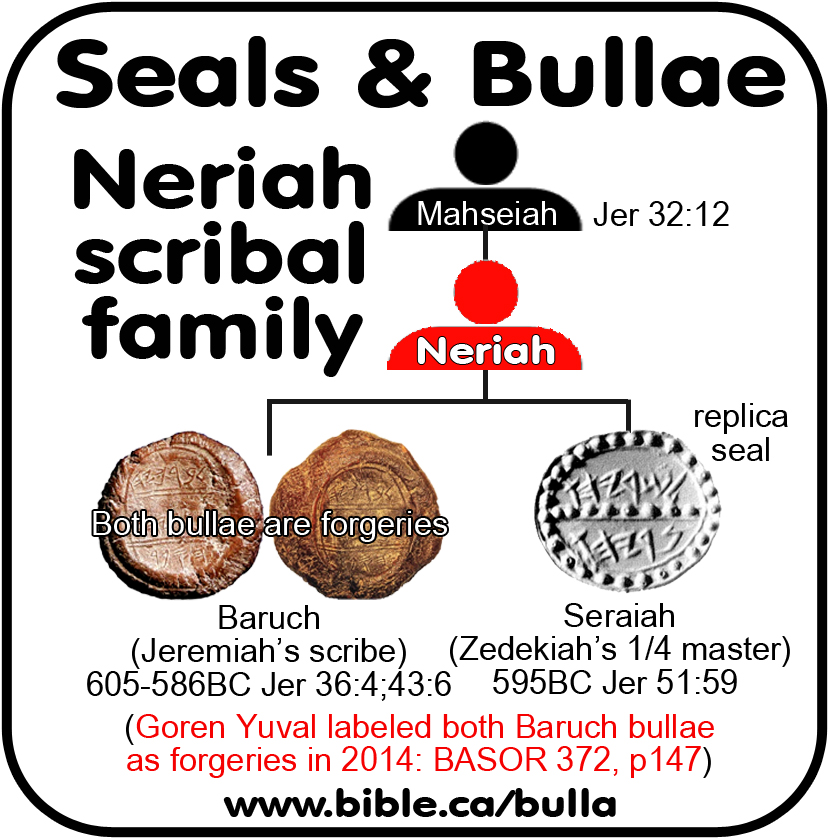
- Scribes were instrumental in the crucifixion of Christ:
- "Now the Passover and Unleavened Bread were two days away; and the chief priests and the scribes were seeking how to seize Him by stealth and kill Him;" (Mark 14:1)
- Many scribes converted to Christianity and immediately filled the role we know today as "church minister" or "Sunday pulpit preacher" in the first century.
- "And Jesus said to them, “Therefore every scribe who has become a disciple of the kingdom of heaven is like a head of a household, who brings out of his treasure things new and old.”" (Matthew 13:52)
- Something old = expounding and teaching Christians all the things they understood and believed as Jews before their conversion to Jesus.
- Converted Scribes brought forth "Something new" = See the many hidden mysteries were existed in the Old Testament that were revealed in the New Testament. Scribes would immediately be able to "connect the dots" and make the application.
- "As to this salvation, the prophets who prophesied of the grace that would come to you made careful searches and inquiries, seeking to know what person or time the Spirit of Christ within them was indicating as He predicted the sufferings of Christ and the glories to follow. It was revealed to them that they were not serving themselves, but you, in these things which now have been announced to you through those who preached the gospel to you by the Holy Spirit sent from heaven—things into which angels long to look." (1 Peter 1:10–12)
- "Now to Him who is able to establish you according to my gospel and the preaching of Jesus Christ, according to the revelation of the mystery which has been kept secret for long ages past, but now is manifested, and by the Scriptures of the prophets, according to the commandment of the eternal God, has been made known to all the nations, leading to obedience of faith; to the only wise God, through Jesus Christ, be the glory forever. Amen." (Romans 16:25–27)
- "but we speak God’s wisdom in a mystery, the hidden wisdom which God predestined before the ages to our glory; the wisdom which none of the rulers of this age has understood; for if they had understood it they would not have crucified the Lord of glory;" (1 Corinthians 2:7–8)
- "that by revelation there was made known to me the mystery, as I wrote before in brief. By referring to this, when you read you can understand my insight into the mystery of Christ, which in other generations was not made known to the sons of men, as it has now been revealed to His holy apostles and prophets in the Spirit; to be specific, that the Gentiles are fellow heirs and fellow members of the body, and fellow partakers of the promise in Christ Jesus through the gospel, of which I was made a minister, according to the gift of God’s grace which was given to me according to the working of His power." (Ephesians 3:3–7)
- Converted Scribes brought forth "Something new" = connecting the hundreds of prophecies about Jesus I the Old Testament to His life, crucifixion, resurrection, kingdom and church.
- "For whatever was written in earlier times [Old Testament] was written for our instruction, so that through perseverance and the encouragement of the Scriptures we might have hope." (Romans 15:4)
- "For I delivered to you as of first importance what I also received, that Christ died for our sins according to the [Old Testament] Scriptures, and that He was buried, and that He was raised on the third day according to the [Old Testament] Scriptures," (1 Corinthians 15:3–4)
- "which God promised beforehand through His prophets in the holy Scriptures, concerning His Son, who was born of a descendant of David according to the flesh, who was declared the Son of God with power by the resurrection from the dead, according to the Spirit of holiness, Jesus Christ our Lord," (Romans 1:2–4)
- "Then Philip opened his mouth, and beginning from this Scripture (Isa 53) he preached Jesus to him." (Acts 8:35)
- "And according to Paul’s custom, he went to them, and for three Sabbaths reasoned with them from the Scriptures, explaining and giving evidence that the Christ had to suffer and rise again from the dead, and saying, “This Jesus whom I am proclaiming to you is the Christ.” And some of them were persuaded and joined Paul and Silas, along with a large number of the God-fearing Greeks and a number of the leading women. But the Jews, becoming jealous and taking along some wicked men from the market place, formed a mob and set the city in an uproar; and attacking the house of Jason, they were seeking to bring them out to the people." (Acts 17:2–5)
- "The brethren immediately sent Paul and Silas away by night to Berea, and when they arrived, they went into the synagogue of the Jews. Now these were more noble-minded than those in Thessalonica, for they received the word with great eagerness, examining the Scriptures daily to see whether these things were so." (Acts 17:10–11)
- "Now a Jew named Apollos, an Alexandrian by birth, an eloquent man, came to Ephesus; and he was mighty in the [Old Testament] Scriptures … and he began to speak out boldly in the synagogue. … he greatly helped those who had believed through grace, for he powerfully refuted the Jews in public, demonstrating by the Scriptures that Jesus was the Christ." (Acts 18:24-28)
III. Document creation, security and storage:
- Two duplicate documents would be folded, tied with strings and sealed with clay, which were then impressed with carved stone seal rings and placed into storage. The original was placed in a secure storage room and an unsealed duplicate was placed in a room outside the storage room so the contents of the sealed document could be read without breaking the seal of the official document. If anyone challenges the duplicate, the seal is broken on the "official" document to settle all disputes.
- "I signed and sealed the deed, and called in witnesses, and weighed out the silver on the scales. “Then I took the deeds of purchase, both the sealed copy containing the terms and conditions and the open copy; and I gave the deed of purchase to Baruch the son of Neriah, the son of Mahseiah, in the sight of Hanamel my uncle’s son and in the sight of the witnesses who signed the deed of purchase, before all the Jews who were sitting in the court of the guard." (Jeremiah 32:10-12)
- "So they went to the king in the court, but they had deposited the scroll in the chamber of Elishama the scribe, and they reported all the words to the king." (Jeremiah 36:20)
- Scriptoriums and "scribe's chambers" is where legal documents were made and stored:
- Scribe's chambers are mentioned at the time of Jeremiah: Jer 36:20
- At Qum'ran, the Essenes produced many written documents in their "Scriptorium" which has been excavated. When the Roman army came in 68 AD, the scribes placed the scrolls in clay jars & hid them in the caves of Qumran. Cave 4 is where the famous Isaiah scroll was found!
|
The Scriptorium of Qum'ran In this room plastered in mud brick, benches and tables were discovered along with 3 ceramic and metal indwells attesting to the fact that the scribes who copied the scrolls sat here.
|
Writing the Dead Sea Scrolls:
About a dozen scrolls as well as myriad fragments of scrolls
of all the books of the Old Testament except Esther. Sectarian texts and other Jewish
literature of that period were found in the caves near Qumran. Texts
uncovered at the excavation, were apparently written and copied in a
scribe's room which was on the second floor of a structure. The scribes wrote
with sharpened reed pens and ink on the parchment sheets that were sewn
together into scrolls. When a scroll was completed it was rolled up and tied
with leather straps.
IV. Seals, Bulla and New Testament imagery:
|
Pictured are: The onyx seal stone of Jaazaniah, servant of Zedekiah and the bulla of Gemariah, scribe of Jeremiah. Both were discovered in professional archeological digs in Israel |
A. Seals authenticated household Identity: Christians are "of Christ's House"
As Christians, we carry around a seal that identifies us as part of God's divine family:
- The High Priest wore three sets of Seal stones
indicating the twelve tribes were of God's family:
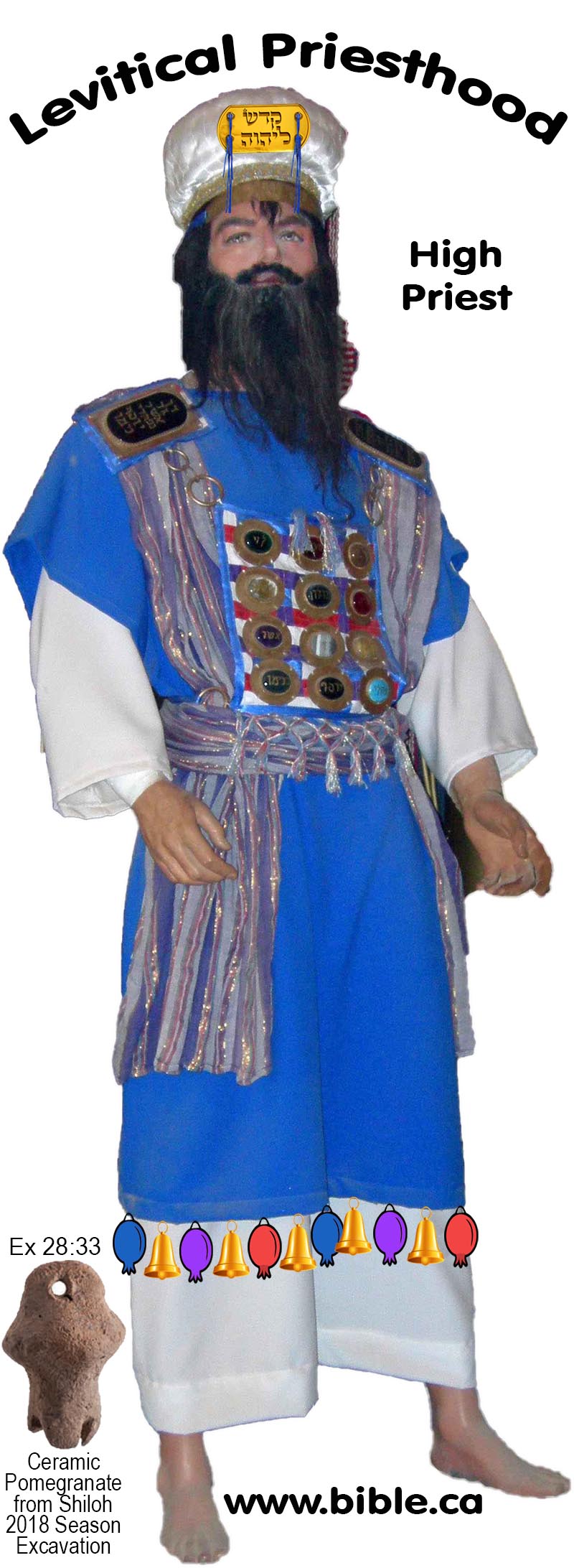
- ONE STONE ON EACH SHOULDER: "You shall take two onyx stones and engrave on them the names of the sons of Israel, six of their names on the one stone and the names of the remaining six on the other stone, according to their birth. “As a jeweler engraves a signet, you shall engrave the two stones according to the names of the sons of Israel; you shall set them in filigree settings of gold. “You shall put the two stones on the shoulder pieces of the ephod, as stones of memorial for the sons of Israel, and Aaron shall bear their names before the Lord on his two shoulders for a memorial." (Exodus 28:9–12)
- TWELVE STONES ON THE EPHOD BREASTPLATE: "He made the breastpiece, the work of a skillful workman, like the workmanship of the ephod: of gold and of blue and purple and scarlet material and fine twisted linen. It was square; they made the breastpiece folded double, a span long and a span wide when folded double. And they mounted four rows of stones on it. The first row was a row of ruby, topaz, and emerald; and the second row, a turquoise, a sapphire and a diamond; and the third row, a jacinth, an agate, and an amethyst; and the fourth row, a beryl, an onyx, and a jasper. They were set in gold filigree settings when they were mounted. The stones were corresponding to the names of the sons of Israel; they were twelve, corresponding to their names, engraved with the engravings of a signet, each with its name for the twelve tribes." (Exodus 39:8–14)
- SEAL ON CROWN: "They made the plate of the holy crown of pure gold, and inscribed it like the engravings of a signet, “Holy to the Lord.” They fastened a blue cord to it, to fasten it on the turban above, just as the Lord had commanded Moses." (Exodus 39:30–31)
- "Signet rings found at Masada indicate that the defenders had a degree of wealth; some rings functioned to make an imprint on wax that sealed legal documents or letters (Yadin 1966: 150). Such signet rings may be the same type as the sphragis mentioned in the NT (Rom 4:11; 1 Cor 9:2; 2 Tim 2:19; Rev 5:1; 6:1; 7:2; 8:1; 9:4). They served as a sign of identity and authority." (Dress and Ornamentation, ABD)
- Each family had their own signet rings at the time of the Exodus in 1446 BC:
- "Everyone whose heart stirred him and everyone whose spirit moved him came and brought the Lord’s contribution for the work of the tent of meeting and for all its service and for the holy garments. Then all whose hearts moved them, both men and women, came and brought brooches and earrings and signet rings and bracelets, all articles of gold; so did every man who presented an offering of gold to the Lord." (Exodus 35:21–22)
- The expression, "house of" is used hundreds of times the Bible to identify the authority of a family clan.
- Joshua 24: as for me and my household… we will follow the Lord
- In the Old Testament there were three powerful houses:
- House of Noah: Heb 11:7
- House of Abraham: Genesis 17:23
- House of Jacob/Israel: Gen 46:27; Ex 16:31
- House of Levi: Ex 2:1
- House of Aaron: Ps 115:12
- House of Joseph: Judges 1:35
- House of Eli: 1 Sam 3:14
- House of Saul: 2 Sam 1:12
- House of David: 2 Sam 1:12
- House of Jeroboam: 1 Kings 14:10
- House of Judah: 2 Kings 19:30
- House of Ahab: 2 Chron 21:6
- House of Haman: Esther 8:1
- House of the Rechabites: Jeremiah 35:2
- House of Esau: Obediah 18
- House of Onesiphorus: 2 Timothy 1:16
- House of Aristobulus: Romans 16:10
- House of Narcissus: Romans 16:11
- House of cloe: 1 Corinthians 1:11
- House of Stephanas: 1 Corinthians 1:16
- House of Caesar: Phil 4:22
- Christians are the House of the faith: (Gal 6:10) House of God: (Ephesians 2:19)
- We are called "Christians" which means literally. "of Christ's household".
We are called children of God which makes us all royal princes.
- "So then you are no longer strangers and aliens, but you are fellow citizens with the saints, and are of God’s household, having been built on the foundation of the apostles and prophets, Christ Jesus Himself being the corner stone, in whom the whole building, being fitted together, is growing into a holy temple in the Lord, in whom you also are being built together into a dwelling of God in the Spirit." (Ephesians 2:19–22)
- "For it is time for judgment to begin with the household of God; and if it begins with us first, what will be the outcome for those who do not obey the gospel of God?" (1 Peter 4:17)
- We are called the "house of God": " I write so that you will know how one ought to conduct himself in the household of God, which is the church of the living God, the pillar and support of the truth." (1 Timothy 3:15)
- "And coming to Him as to a living stone which has been rejected by men, but is choice and precious in the sight of God, you also, as living stones, are being built up as a spiritual house for a holy priesthood, to offer up spiritual sacrifices acceptable to God through Jesus Christ." (1 Peter 2:4–5)
- Aliens are adopted directly into God's family by faith, not blood:
- "For you are all SONS OF GOD through faith in Christ Jesus. For all of you who were BAPTIZED INTO CHRIST have clothed yourselves with Christ. There is neither Jew nor Greek, there is neither slave nor free man, there is neither male nor female; for you are all one in Christ Jesus. And if you belong to Christ, then you are ABRAHAM’S DESCENDANTS, HEIRS according to promise." (Galatians 3:26–29)
- "For this reason it is by faith, in order that it may be in accordance with grace, so that the promise will be guaranteed to all the descendants, not only to those who are of the Law, but also to those who are of the faith of Abraham, who is the father of us all, (as it is written, “A father of many nations have I made you”) in the presence of Him whom he believed, even God, who gives life to the dead and calls into being that which does not exist. In hope against hope he believed, so that he might become a father of many nations according to that which had been spoken, “So shall your descendants be.”" (Romans 4:16–18)
- "Therefore, be sure that it is those who are of faith who are sons of Abraham. The Scripture, foreseeing that God would justify the Gentiles by faith, preached the gospel beforehand to Abraham, saying, “All the nations will be blessed in you.” So then those who are of faith are blessed with Abraham, the believer." (Galatians 3:7-9)
- "I am telling the truth in Christ, I am not lying, my conscience testifies with me in the Holy Spirit, that I have great sorrow and unceasing grief in my heart. For I could wish that I myself were accursed, separated from Christ for the sake of my brethren, my kinsmen according to the flesh, who are Israelites, to whom belongs the adoption as sons, and the glory and the covenants and the giving of the Law and the temple service and the promises, whose are the fathers, and from whom is the Christ according to the flesh, who is over all, God blessed forever. Amen. But it is not as though the word of God has failed. For they are not all Israel who are descended from Israel; nor are they all children because they are Abraham’s descendants, but: “through Isaac your descendants will be named.” That is, it is not the children of the flesh who are children of God, but the children of the promise are regarded as descendants." (Romans 9:1–8)
- Seals were proof of Inheritance by certifying family heritage:
- "“Blessed are the gentle, for they shall inherit the earth." (Matthew 5:5)
- "“And everyone who has left houses or brothers or sisters or father or mother or children or farms for My name’s sake, will receive many times as much, and will inherit eternal life." (Matthew 19:29)
- "“Then the King will say to those on His right, ‘Come, you who are blessed of My Father, inherit the kingdom prepared for you from the foundation of the world." (Matthew 25:34)
- "Or do you not know that the unrighteous will not inherit the kingdom of God? Do not be deceived; neither fornicators, nor idolaters, nor adulterers, nor effeminate, nor deviant sex practitioners, nor thieves, nor the covetous, nor drunkards, nor revilers, nor swindlers, will inherit the kingdom of God. Such were some of you; but you were washed, but you were sanctified, but you were justified in the name of the Lord Jesus Christ and in the Spirit of our God." (1 Corinthians 6:9–11)
- "Are they not all ministering spirits, sent out to render service for the sake of those who will inherit salvation?" (Hebrews 1:14)
- "so that you will not be sluggish, but imitators of those who through faith and patience inherit the promises." (Hebrews 6:12)
- "Blessed be the God and Father of our Lord Jesus Christ, who according to His great mercy has caused us to be born again to a living hope through the resurrection of Jesus Christ from the dead, to obtain an inheritance which is imperishable and undefiled and will not fade away, reserved in heaven for you, who are protected by the power of God through faith for a salvation ready to be revealed in the last time." (1 Peter 1:3–5)
- "Then He said to me, “It is done. I am the Alpha and the Omega, the beginning and the end. I will give to the one who thirsts from the spring of the water of life without cost. “He who overcomes will inherit these things, and I will be his God and he will be My son." (Revelation 21:6–7)
- Special status, special blessings, special confidence with God's family:
- "For all who are being led by the Spirit of God, THESE ARE SONS OF GOD. For you have not received a spirit of slavery leading to fear again, but you have received a spirit of ADOPTION AS SONS by which we cry out, “Abba! Father!” The Spirit Himself testifies with our spirit that we are CHILDREN OF GOD, AND IF CHILDREN, HEIRS ALSO, heirs of God and fellow heirs with Christ, if indeed we suffer with Him so that we may also be glorified with Him. For I consider that the sufferings of this present time are not worthy to be compared with the glory that is to be revealed to us. For the anxious longing of the creation waits eagerly for the revealing of the sons of God. For the creation was subjected to futility, not willingly, but because of Him who subjected it, in hope that the creation itself also will be set free from its slavery to corruption into the freedom of the glory of the children of God. For we know that the whole creation groans and suffers the pains of childbirth together until now. And not only this, but also we ourselves, having the first fruits of the Spirit, even we ourselves groan within ourselves, waiting eagerly for our ADOPTION AS SONS, the redemption of our body." (Romans 8:14–23)
- "But when the fullness of the time came, God sent forth His Son, born of a woman, born under the Law, so that He might redeem those who were under the Law, that we might receive the adoption as sons. Because you are sons, God has sent forth the Spirit of His Son into our hearts, crying, “Abba! Father!” Therefore you are no longer a slave, but a son; and if a son, then an heir through God." (Galatians 4:4–7)
- "Blessed be the God and Father of our Lord Jesus Christ, who has blessed us with every spiritual blessing in the heavenly places in Christ, just as He chose us in Him before the foundation of the world, that we would be holy and blameless before Him. In love He predestined us to adoption as sons through Jesus Christ to Himself, according to the kind intention of His will, to the praise of the glory of His grace, which He freely bestowed on us in the Beloved." (Ephesians 1:3-6)
- "For this reason I, Paul, the prisoner of Christ Jesus for the sake of you Gentiles— if indeed you have heard of the stewardship of God’s grace which was given to me for you; that by revelation there was made known to me the mystery, as I wrote before in brief. By referring to this, when you read you can understand my insight into the mystery of Christ, which in other generations was not made known to the sons of men, as it has now been revealed to His holy apostles and prophets in the Spirit; to be specific, that the GENTILES ARE FELLOW HEIRS AND FELLOW MEMBERS OF THE BODY, AND FELLOW PARTAKERS OF THE PROMISE IN CHRIST JESUS THROUGH THE GOSPEL, of which I was made a minister, according to the gift of God’s grace which was given to me according to the working of His power. To me, the very least of all saints, this grace was given, to preach to the Gentiles the unfathomable riches of Christ, and to bring to light what is the administration of the mystery which for ages has been hidden in God who created all things; so that the manifold wisdom of God might now be made known through the church to the rulers and the authorities in the heavenly places. This was in accordance with the eternal purpose which He carried out in Christ Jesus our Lord, in whom we have boldness and CONFIDENT ACCESS THROUGH FAITH IN HIM." (Ephesians 3:1–12)
B. Seals facilitated the delegation of authority
Seals empowered and authorized you in the name of the seal owner, with the seal-owners full authority.
- Bible examples of kings giving other's their seal rings:
- "Pharaoh said to Joseph, “See, I have set you over all the land of Egypt.” Then Pharaoh took off his signet ring from his hand and put it on Joseph’s hand, and clothed him in garments of fine linen and put the gold necklace around his neck. He had him ride in his second chariot; and they proclaimed before him, “Bow the knee!” And he set him over all the land of Egypt." (Genesis 41:41–43)
- "So Jezebel wrote letters in Ahab’s name and sealed them with his seal, and sent letters to the elders and to the nobles who were living with Naboth in his city." (1 Kings 21:8)
- "“As I live,” declares the Lord, “even though Coniah the son of Jehoiakim king of Judah were a signet ring on My right hand, yet I would pull you off" (Jeremiah 22:24)
- "Then the king took his signet ring from his hand and gave it to Haman, the son of Hammedatha the Agagite, the enemy of the Jews. The king said to Haman, “The silver is yours, and the people also, to do with them as you please.” Then the king’s scribes were summoned on the thirteenth day of the first month, and it was written just as Haman commanded to the king’s satraps, to the governors who were over each province and to the princes of each people, each province according to its script, each people according to its language, being written in the name of King Ahasuerus and sealed with the king’s signet ring." (Esther 3:10–12)
- "The king took off his signet ring which he had taken away from Haman, and gave it to Mordecai. And Esther set Mordecai over the house of Haman." (Esther 8:2)
- “Now you write to the Jews as you see fit, in the king’s name, and seal it with the king’s signet ring; for a decree which is written in the name of the king and sealed with the king’s signet ring may not be revoked.”" (Esther 8:8)
- Non-biblical references:
- "So queen Helena complied with this counsel of theirs, and set up Monobazus, the eldest son, to be king, and put the diadem upon his head, and gave him his father’s ring, with its signet; as also the ornament which they called Sampser, and exhorted him to administer the affairs of the kingdom till his brother should come; (33) who came suddenly upon hearing that his father was dead, and succeeded his brother Monobazus, who resigned up the government to him." (Josephus Antiquities 20.32-33)
- "And he called for Philip, one of his Friends, and set him over all his kingdom, and gave him (his) diadem, and his robe, and (his) signet-ring, to the end that he should educate Antiochus his son, and bring him up to be king. And king Antiochus died therein the one hundred and forty-ninth year." (1 Maccabees 6:14–16)
- Possession of a seal stone of the town drunk was worthless for anything but the seal stone of the town mayor gave you enormous power.
- We are told to baptize by full immersion, in the name of the Father, Son and Holy Spirit in order to receive remission of sins and eternal salvation. Mt 28:18-19; Acts 2:38; Acts 22:16; 1 Peter 3:21
C. Seals identified ownership:
Every man on earth has one of two marks of ownership: God's or Devil
- Commercial stamps and branding:
- Ancient buyers of timber in the forests of Asia Minor would select trees which would be felled, stamped them with the buyer’s seal, and floated them downstream. At the port in Ephesus, the markings would identify the logs. God stamps us with His seal, indicating ownership.
- Ranchers sear a property identification mark onto their cows with hot branding Iron. Once each rancher has branded all their cattle, they let them all run together as a single heard for efficiency. At slaughter time, the cows are easily reunited with their owner.
- "For you have been bought with a price: therefore glorify God in your body." (1 Corinthians 6:20)
- "Nevertheless, the firm foundation of God stands, having this seal, “The Lord knows those who are His,” and, “Everyone who names the name of the Lord is to abstain from wickedness.”" (2 Timothy 2:19)
- “This one will say, ‘I am the Lord’s’; And that one will call on the name of Jacob; And another will write on his hand, ‘Belonging to the Lord,’ And will name Israel’s name with honor." (Isaiah 44:5)
- "A bulla (pl. bullae) is a clay seal used on papyrus or parchment official documents. After a document was written and rolled or folded, a piece of rope or other material was tied around it to keep the document closed. To ensure that the rope would not be untied by the wrong person, a lump of clay was attached to the ends of the rope thus binding them. An official seal was then used to make an impression in the wet clay thereby assuring the sender that the bulla would not be broken by other than the intended recipient of the document. Two kinds of seals were used in antiquity: a stamp seal and a cylinder seal. A stamp seal pressed into the clay left its impression in it. A cylinder seal rolled over the clay and left an elongated impression. Since seals were also used to indicate ownership, they were also used on items such as pottery. The modern use of wax and a stamp seal on official documents or letters is similar to that of the ancient clay bulla." (Young Archaeologist Strikes Pay Dirt, Oded Borowski, BAR 07:04 , 1981 AD)
- BELONGING TO THE KING: "J. B. Pritchard’s
excavations at el-Jib in 1956, 1957, 1959, and 1960. Included among the
finds were thirty-one jar handles inscribed with the name “Gibeon”
(gbʿn) in ancient Hebrew script" (ABD)
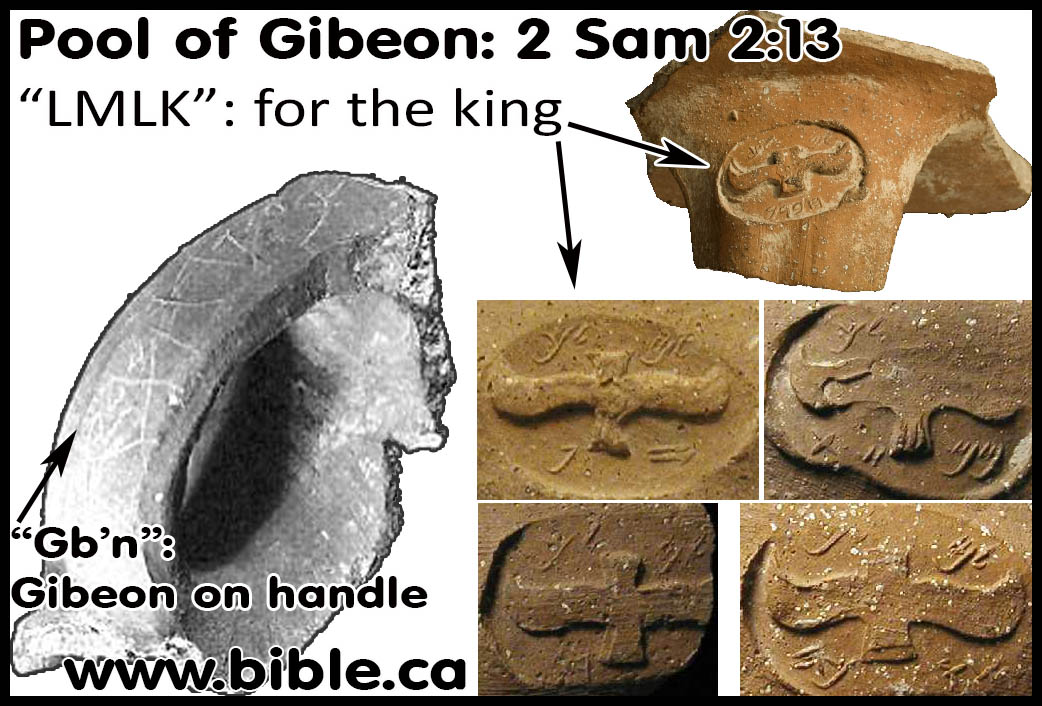
- Pottery stamp of "Yeho'ezer, the Governor" on
storage jar handle: The fourth governor of Judah 490-470 BC. Discovered
in 1930 AD at Ramat Rachel near Bethlehem.
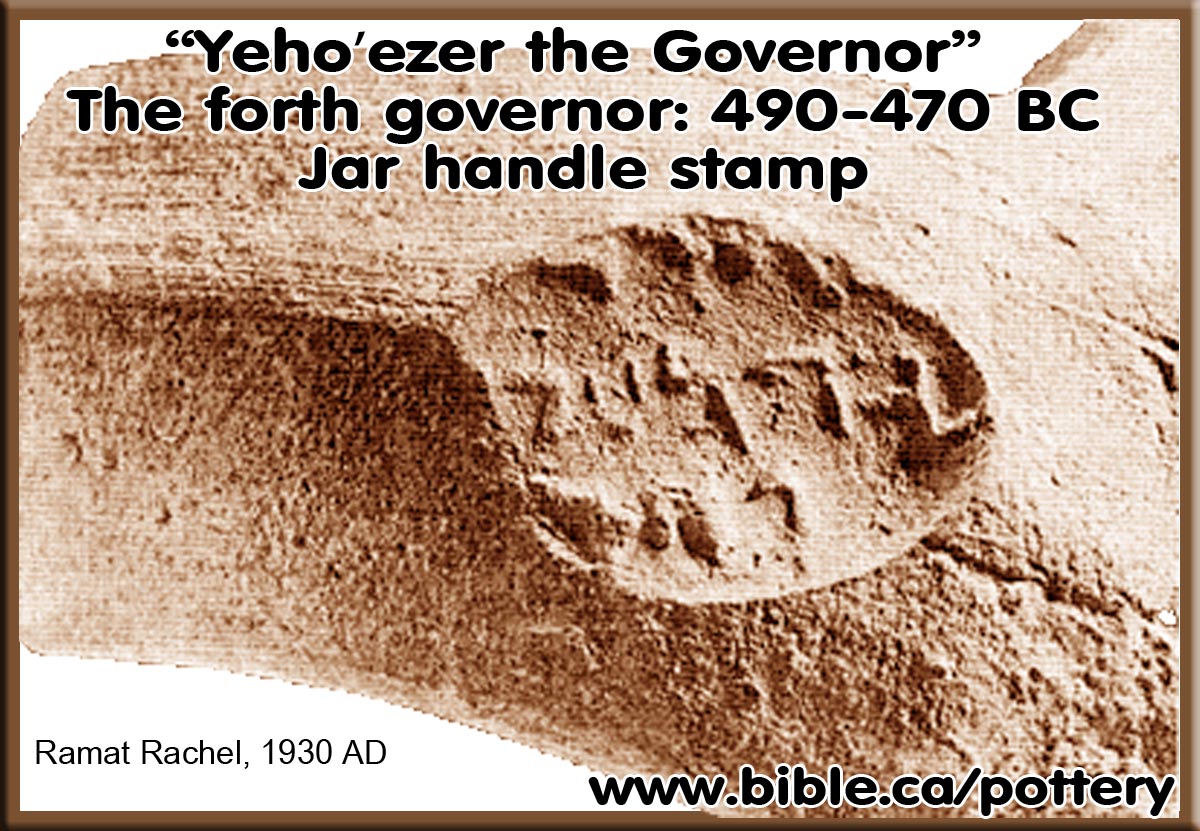
- Bullas marked the property of the seal owner like a branding iron for cattle.
- Paul metaphorically likened his bodily scars and physical disfigurement from the many times he was stoned, beaten etc. as a "cattle brand mark" from Jesus that he was a Christian.
- "From now on let no one cause trouble for me, for I bear on my body the brand-marks of Jesus." (Galatians 6:17)
- "But the Spirit explicitly says that in later times some will fall away from the faith, paying attention to deceitful spirits and doctrines of demons, by means of the hypocrisy of liars seared in their own conscience as with a branding iron, men who forbid marriage and advocate abstaining from foods which God has created to be gratefully shared in by those who believe and know the truth." (1 Timothy 4:1–3)
- Marking on forehead and hand:
- "Then He cried out in my hearing with a loud voice saying, “Draw near, O executioners of the city, each with his destroying weapon in his hand.” Behold, six men came from the direction of the upper gate which faces north, each with his shattering weapon in his hand; and among them was a certain man clothed in linen with a writing case at his loins. And they went in and stood beside the bronze altar. Then the glory of the God of Israel went up from the cherub on which it had been, to the threshold of the temple. And He called to the man clothed in linen AT WHOSE LOINS WAS THE WRITING CASE. The Lord said to him, “Go through the midst of the city, even through the midst of Jerusalem, and put a mark [Hebrew word for letter Tav = a cross "+" from which we get the letter "T" in English] on the foreheads of the men who sigh and groan over all the abominations which are being committed in its midst.” But to the others He said in my hearing, “Go through the city after him and strike; do not let your eye have pity and do not spare. “Utterly slay old men, young men, maidens, little children, and women, but do not touch any man on whom is the mark; and you shall start from My sanctuary.” So they started with the elders who were before the temple. And He said to them, “Defile the temple and fill the courts with the slain. Go out!” Thus they went out and struck down the people in the city. As they were striking the people and I alone was left, I fell on my face and cried out saying, “Alas, Lord God! Are You destroying the whole remnant of Israel by pouring out Your wrath on Jerusalem?” Then He said to me, “The iniquity of the house of Israel and Judah is very, very great, and the land is filled with blood and the city is full of perversion; for they say, ‘The Lord has forsaken the land, and the Lord does not see!’ “But as for Me, My eye will have no pity nor will I spare, but I will bring their conduct upon their heads.” Then behold, the man clothed in linen at whose loins was the WRITING CASE reported, saying, “I have done just as You have commanded me.”" (Ezekiel 9:1–11)
- "They were told not to hurt the grass of the earth, nor any green thing, nor any tree, but only the men who do not have the seal of God on their foreheads." (Revelation 9:4)
- "And I saw another angel ascending from the rising of the sun, having the seal of the living God; and he cried out with a loud voice to the four angels to whom it was granted to harm the earth and the sea, saying, “Do not harm the earth or the sea or the trees until we have sealed the bond-servants of our God on their foreheads. And I heard the number of those who were sealed, one hundred and forty-four thousand sealed from every tribe of the sons of Israel:" (Revelation 7:2-4)
- "Then I saw thrones, and they sat on them, and judgment was given to them. And I saw the souls of those who had been beheaded because of their testimony of Jesus and because of the word of God, and those who had not worshiped the beast or his image, and had not received the mark on their forehead and on their hand; and they came to life and reigned with Christ for a thousand years." (Revelation 20:4)
D. Seals guaranteed security from tampering or changing the contract:
Bullas prevented tampering or changing of the contents of the document or object.
- Seals of Revelation:
- "Then I saw in the right hand of the one seated on the throne a scroll written on the inside and on the back, sealed with seven seals;" (Revelation 5:1)
- "Then I saw the Lamb open one of the seven seals, and I heard one of the four living creatures call out, as with a voice of thunder, “Come!”" (Revelation 6:1,3,5,7,9,12; 8:1)
- Bullas guard against the text of a Legal contracts being tampered with or fraudulently changed. The clay bulla ensured that "criminals" had not "broken into" the document and altered something to their own benefit.
- "Because of all this we make a firm agreement in writing, and on that sealed document are inscribed the names of our officials, our Levites, and our priests." (Nehemiah 9:38)
- "Upon the sealed document are the names of Nehemiah the governor, son of Hacaliah, and Zedekiah;" (Nehemiah 10:1)
- Daniel's and Jesus' tombs were sealed to prevent tampering:
- "A stone was brought and laid over the mouth of the den; and the king sealed it with his own signet ring and with the signet rings of his nobles, so that nothing would be changed in regard to Daniel." (Daniel 6:17)
- "So they went with the guard and made the tomb secure by sealing the stone." (Matthew 27:66)
- Spouses seal each other in love when they marry to not be "tampered" by another.
- "Set me as a seal upon your heart, as a seal upon your arm; for love is strong as death, passion fierce as the grave. Its flashes are flashes of fire, a raging flame." (Song of Solomon 8:6)
- The devil was sealed in the Pit:
- "and threw him into the pit, and locked and sealed it over him, so that he would deceive the nations no more, until the thousand years were ended. After that he must be let out for a little while." (Revelation 20:3)
E. Seals created secret time capsules.
Seals created time capsules of secret information to be revealed later time.
- A will is a legal contract that determines which one of your kids gets the house, the Lexus and the lump of coal (nothing: cut out of the will). Parents do not want their make it known, what the children suspected all along, namely that "John Boy" was their favorite and he "gets is all" while the rest of the children get nothing. So the will is signed and sealed with a bulla which is broken only upon death.
- The mystery of the revelation of God was sealed at the time of Daniel and UNSEALED/revealed by Christ:
- "Seventy weeks are decreed for your people and your holy city: to finish the transgression, to put an end to sin, and to atone for iniquity, to bring in everlasting righteousness, to seal both vision and prophet, and to anoint a most holy place." (Daniel 9:24)
- "But as for you, Daniel, conceal these words and seal up the book until the end of time; many will go back and forth, and knowledge will increase. … As for me, I heard but could not understand; so I said, “My lord, what will be the outcome of these events?” He said, “Go your way, Daniel, for these words are concealed and sealed up until the end time." (Daniel 12:4,8-9)
- "“Therefore when you see the abomination of desolation which was spoken of through Daniel the prophet, standing in the holy place (let the reader understand)," (Matthew 24:15)
- Revelation (66 AD) is a prophecy of the destruction of Jerusalem in 70 AD was NOT to be sealed but for immediate publication: "And he said to me, “Do not seal up the words of the prophecy of this book, for the time is near." (Revelation 22:10)
- John heard things he was not permitted to write: "And when the seven thunders had sounded, I was about to write, but I heard a voice from heaven saying, “Seal up what the seven thunders have said, and do not write it down.”" (Revelation 10:4)
F. Seals showed validation and approval of the object stamped:
- God sealed Christ and granted him authority: "It is on Christ that God the Father has set his seal.”" (John 6:27)
- Paul approved of the Corinthians who he converted:
- "If I am not an apostle to others, at least I am to you; for you are the seal of my apostleship in the Lord." (1 Corinthians 9:2)
- Each man has their own personal seal which we use to approve and vessel which is stamped:
- "He who has received His testimony has set his SEAL to this, that God is true." (John 3:33)
- When we decide to obey Christ, it is then that we take our own personal seal and stamp "GOD IT TRUE".
- This is a choice each of us will carry to judgement, so choose wisely, chose God!
G. Seals were tangible pledges of security
- "It was told to Tamar, “Behold, your father-in-law is going up to Timnah to shear his sheep.” So she removed her widow’s garments and covered herself with a veil, and wrapped herself, and sat in the gateway of Enaim, which is on the road to Timnah; for she saw that Shelah had grown up, and she had not been given to him as a wife. When Judah saw her, he thought she was a harlot, for she had covered her face. So he turned aside to her by the road, and said, “Here now, let me come in to you”; for he did not know that she was his daughter-in-law. And she said, “What will you give me, that you may come in to me?” He said, therefore, “I will send you a young goat from the flock.” She said, moreover, “Will you give a pledge until you send it?” He said, “What pledge shall I give you?” And she said, “YOUR SEAL and your cord, and your staff that is in your hand.” So he gave them to her and went in to her, and she conceived by him… It was while she was being brought out that she sent to her father-in-law, saying, “I am with child by the man to whom these things belong.” And she said, “Please examine and see, WHOSE SIGNET RING and cords and staff are these?” Judah recognized them, and said, “She is more righteous than I, inasmuch as I did not give her to my son Shelah.” And he did not have relations with her again." (Genesis 38:25–26) " (Genesis 38:13–26)
- Seals were a small tangible pledge or down payment that guaranteed full payment of a promise. Most contracts of purchase require the buyer to make a down payment to the seller.
- If the purchaser of a car or house refused to give the balance, the seller gets to keep the money.
- In Biblical times, marriage contracts determined the "bride price" (money, assets, land, services) the groom had to pay the father of the bride before he could sleep with her.
- In modern Greece, the identical word for pledge/earnest/down payment; "arrabon" is used of an engagement ring given to a woman.
- Today if a guy calls off the wedding, the jilted bride gets to keep the ring for her tears.
- Jesus gave the Holy Spirit (ie., the miraculous gifts of the apostolic age) to the disciples as a substitute in His absence.
- The gifts of the Holy Spirit were a tangible foretaste of the great powers we will have in Heaven:
- "For in the case of those who have once been enlightened and have tasted of the heavenly gift and have been made partakers of the Holy Spirit, and have tasted the good word of God and the powers of the age to come," (Hebrews 6:4–5)
- The gifts of the Holy Spirit were a tangible down payment of eternal life. God has promised eternal life and as a guarantee, he has given us the Holy Spirit.
- "In Him, you also, after listening to the message of truth, the gospel of your salvation—having also believed, you were sealed in Him with the Holy Spirit of promise, who is given as a pledge of our inheritance, with a view to the redemption of God’s own possession, to the praise of His glory." (Ephesians 1:13–14)
- "Do not grieve the Holy Spirit of God, by whom you were sealed for the day of redemption." (Ephesians 4:30)
- "Now He who establishes us with you in Christ and anointed us is God, who also sealed us and gave us the Spirit in our hearts as a pledge." (2 Corinthians 1:21–22)
- "Now He who prepared us for this very purpose is God, who gave to us the Spirit as a pledge." (2 Corinthians 5:5)
Conclusion:
- We have both pottery and seals applied to Christians in one passage:
- "Nevertheless, the firm foundation of God stands, having this seal, “The Lord knows those who are His,” and, “Everyone who names the name of the Lord is to abstain from wickedness.” Now in a large house there are not only gold and silver vessels, but also vessels of wood and of earthenware, and some to honor and some to dishonor. Therefore, if anyone cleanses himself from these things, he will be a vessel for honor, sanctified, useful to the Master, prepared for every good work." (2 Timothy 2:19–21)
- The meaning of the seal stone is simple: God will do his part in protecting us if man will do his part in obedience holy living. Just as in the steps to salvation, God supplies the grace, mercy and blood of Christ, man must supply the faith, repentance, confession and water baptism and remain faithful till death.
|
Antitypical in 2 Timothy 2:19-21 |
||
|
Text of Seal line one |
God's part: I will protect you: “The Lord knows those who are His” |
|
|
Text of Seal line two |
Man's part: be holy: “Everyone who names the name of the Lord is to abstain from wickedness.” |
|
|
Pottery |
"Earthenware vessel for honor" |
|
- THE HIGH PRIEST AND EVERY CHRISTIAN HAVE THE SAME SEAL:
- "Nevertheless, the firm foundation of God stands, having this seal, “The Lord knows those who are His,” and, “Everyone who names the name of the Lord is to abstain from wickedness.”" (2 Timothy 2:19)
- ONE STONE ON EACH SHOULDER: "You shall take two onyx stones and engrave on them the names of the sons of Israel … You shall put the two stones on the shoulder pieces of the ephod, as stones of memorial for the sons of Israel, and Aaron shall bear their names before the Lord on his two shoulders for a memorial." (Exodus 28:9–12)
- TWELVE STONES ON THE EPHOD BREASTPLATE: "He made the breastpiece … The stones were corresponding to the names of the sons of Israel; they were twelve, corresponding to their names, engraved with the engravings of a signet, each with its name for the twelve tribes." (Exodus 39:8–14)
- SEAL ON CROWN: "They made the plate of the holy crown of pure gold, and inscribed it like the engravings of a signet, “Holy to the Lord.”." (Exodus 39:30–31)
- "And I saw another angel ascending from the rising of the sun, having the seal of the living God; and he cried out with a loud voice to the four angels to whom it was granted to harm the earth and the sea, saying, “Do not harm the earth or the sea or the trees until we have sealed the bond-servants of our God on their foreheads. And I heard the number of those who were sealed, one hundred and forty-four thousand sealed from every tribe of the sons of Israel:" (Revelation 7:2-4)
- "Then I looked, and behold, the Lamb was standing on Mount Zion, and with Him one hundred and forty-four thousand, having His name and the name of His Father written on their foreheads." (Revelation 14:1)
|
High Priest seal stones |
Christian Priest seal stones: Rev 7:2-4; 14:1 |
|
|
12 tribes of God: Twelve stones on the ephod breastplate (Ex 39:8-14) 2 Shoulder stones: (Ex 28:9-12) |
"Christian = belongs to Christ" “The Lord knows those who are His” (2 Ti 2:19) |
|
|
Seal on crown: "Holy to the Lord" (Ex 39:30-31) |
“Everyone who names the name of the Lord is to abstain from wickedness.”" (2 Ti 2:19) |
- Messianic prophecy of Christ: "‘On that day,’ declares the Lord of hosts, ‘I will take you, Zerubbabel, son of Shealtiel, My servant,’ declares the Lord, ‘and I will make you like a signet ring, for I have chosen you,’ ” declares the Lord of hosts." (Haggai 2:23)
- “All authority has been given to Me in heaven and on earth. “Go therefore and make disciples of all the nations, baptizing them in the name of the Father and the Son and the Holy Spirit, teaching them to observe all that I commanded you; and lo, I am with you always, even to the end of the age.”" (Matthew 28:18–20)
- God sets his seal upon us when we are water baptized: We become "Christians who are Holy"
- "and he received the sign of circumcision, a seal of the righteousness of the faith which he had while uncircumcised, so that he might be the father of all who believe without being circumcised, that righteousness might be credited to them," (Romans 4:11)
- "and in Him you were also circumcised with a circumcision made without hands, in the removal of the body of the flesh by the circumcision of Christ; having been buried with Him in baptism, in which you were also raised up with Him through faith in the working of God, who raised Him from the dead." (Colossians 2:11–12)
- I AM USING CHRIST'S SEAL STONE HE ME RIGHT NOW: BE BAPTIZED: We are in possession of God's seal and are given authority to baptize by full immersion, in the name of the Father, Son and Holy Spirit in order to receive remission of sins and eternal salvation. Mt 28:18-19; Acts 2:38; Acts 22:16; 1 Peter 3:21
- If you do not allow yourself to be sealed by God, the Devil will imprint you with his seal:
- "Then I saw thrones, and they sat on them, and judgment was given to them. And I saw the souls of those who had been beheaded because of their testimony of Jesus and because of the word of God, and those who had not worshiped the beast or his image, and had not received the mark on their forehead and on their hand; and they came to life and reigned with Christ for a thousand years." (Revelation 20:4)
- Men are made from clay. God takes our ugly clay and makes us into something beautiful:
- "[God changes darkness into a beautiful morning light] like clay under the seal" (Job 38:14) Just as God takes an ugly lump of clay and transforms it with His seal stone into something into something beautiful, so too sinful men are transformed into conformity of the divine nature.
- "And do not be conformed to this world, but be transformed by the renewing of your mind, so that you may prove what the will of God is, that which is good and acceptable and perfect." (Romans 12:2)
- The message of the gospel is foolishness to a world of lost and unbelieving scribes:
- "Be delayed and wait, Blind yourselves and be blind; They become drunk, but not with wine, They stagger, but not with strong drink. For the Lord has poured over you a spirit of deep sleep, He has shut your eyes, the prophets; And He has covered your heads, the seers. The entire vision will be to you like the words of a sealed book, which when they give it to the one who is literate, saying, “Please read this,” he will say, “I cannot, for it is sealed.” Then the book will be given to the one who is illiterate, saying, “Please read this.” And he will say, “I cannot read.” Then the Lord said, “Because this people draw near with their words And honor Me with their lip service, But they remove their hearts far from Me, And their reverence for Me consists of tradition learned by rote, Therefore behold, I will once again deal marvelously with this people, wondrously marvelous; And the wisdom of their wise men will perish, And the discernment of their discerning men will be concealed.” (Isaiah 29:9-14)
- "They have the technical skills to understand God’s word, but they lack the spiritual insight which would enable them to see the plain meaning. So, of course, the situation is hopeless for the common person. He cannot even read, let alone open and read. The Church today is in a perilously similar situation. The pews are full of people who look to someone who can “read,” but for all too many who can do so, the document is still sealed." (NICOT, Isa 29:11, 1986 AD)
- "This passage contains three distinct paragraphs (9–10, 11–12, 13–14). The third is formally identified as an utterance of Yahveh addressed to the seer about “this people.” The first and second are linked by the theme of spiritual imperception and hebetude under the metaphors of blindness, drunken stupor, sleep, and illiteracy but are rhetorically quite different from one another. … The change to straightforward prose in 11–12 has also convinced most recent commentators that this figurative allusion to Isaian prophecies as a sealed book is an editorial addition referring the incomprehension of the public vis-à-vis the prophet’s oral communication—represented figuratively as linguistic incompetence (28:11)—to the written prophecies in whatever form they existed at that time. The modal change is understandable in view of the greater prominence of written prophecy at the time when this brief section (11–12) was added." (ABD, Isa 19:11, 2008 AD)
- "And He said to them, “Rightly did Isaiah prophesy of you hypocrites, as it is written: ‘This people honors Me with their lips, But their heart is far away from Me. ‘But in vain do they worship Me, Teaching as doctrines the precepts of men.’ “Neglecting the commandment of God, you hold to the tradition of men.”" (Mark 7:6–8)
- "“In their case the prophecy of Isaiah is being fulfilled, which says, ‘You will keep on hearing, but will not understand; You will keep on seeing, but will not perceive; For the heart of this people has become dull, With their ears they scarcely hear, And they have closed their eyes, Otherwise they would see with their eyes, Hear with their ears, And understand with their heart and return, And I would heal them.’ “But blessed are your eyes, because they see; and your ears, because they hear." (Matthew 13:14–16)
- "For the word of the cross is foolishness to those who are perishing, but to us who are being saved it is the power of God. For it is written, “I will destroy the wisdom of the wise, And the cleverness of the clever I will set aside.” Where is the wise man? Where is the scribe? Where is the debater of this age? Has not God made foolish the wisdom of the world?" (1 Corinthians 1:18-20)
Will you arise and let me baptize you to wash away your sins so I can stamp you with God's seal on your forehead?
SONG: Hallelujah! What a Savior
Man of Sorrows! what a name
For the Son of God, Who came
Ruined sinners to reclaim.
Hallelujah! What a Savior!
Bearing shame and scoffing rude,
In my place condemned He stood;
SEALED my pardon with His blood.
Hallelujah! What a Savior!
Guilty, vile, and helpless we;
Spotless Lamb of God was He;
“FULL ATONEMENT!” can it be?
Hallelujah! What a Savior!
Lifted up was He to die;
“It is finished!” was His cry;
Now in Heav’n exalted high.
Hallelujah! What a Savior!
When He comes, our glorious King,
All His ransomed home to bring,
Then anew His song we’ll sing:
Hallelujah! What a Savior!
By Steve Rudd Sept 2016
By Steve Rudd: Contact the author for comments, input or corrections.
